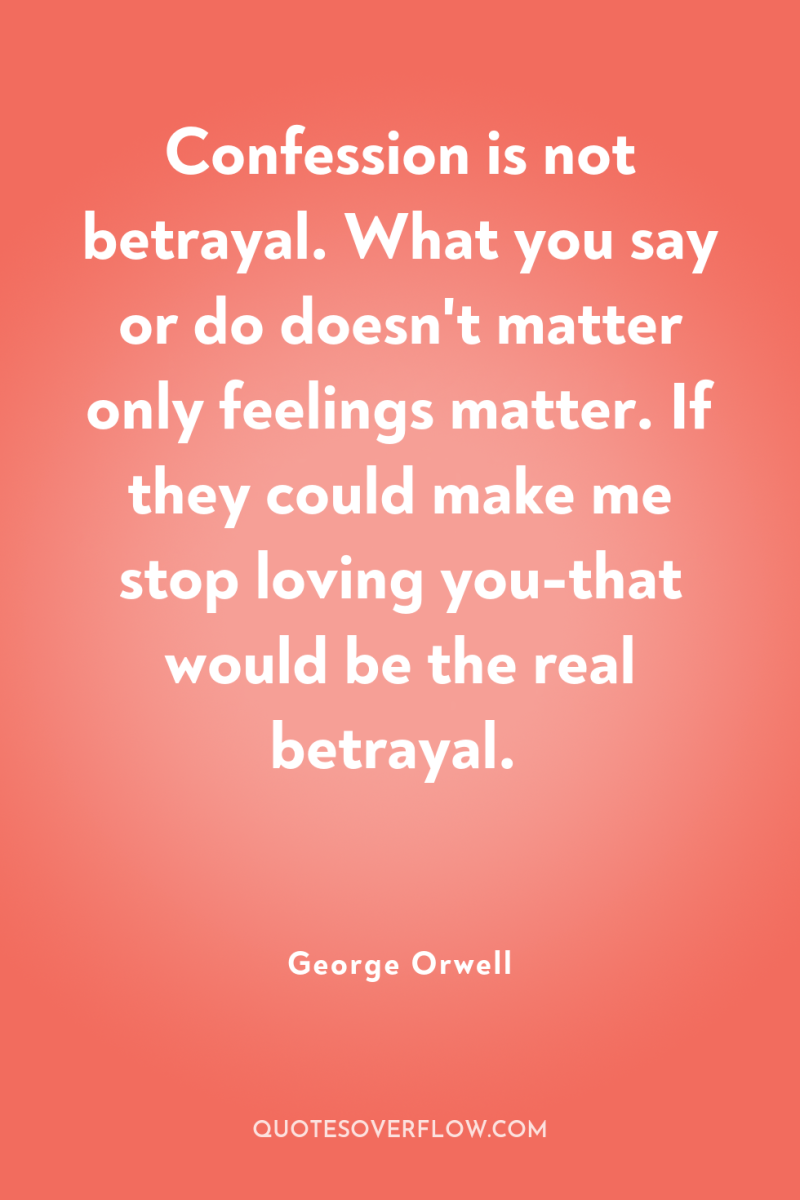
1
Confession is not betrayal. What you say or do doesn't matter only feelings matter. If they could make me stop loving you-that would be the real betrayal.George Orwell

2
At 50, everyone has the face he deserves.George Orwell
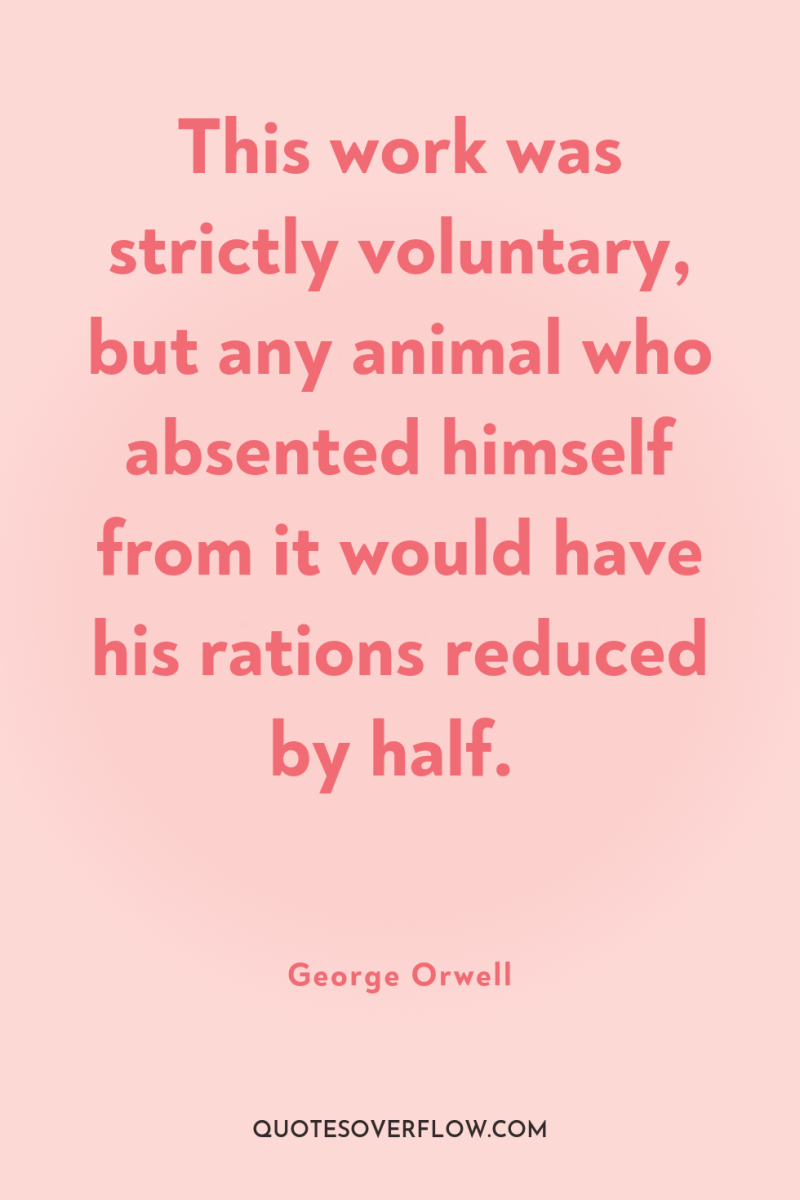
3
This work was strictly voluntary, but any animal who absented himself from it would have his rations reduced by half.George Orwell
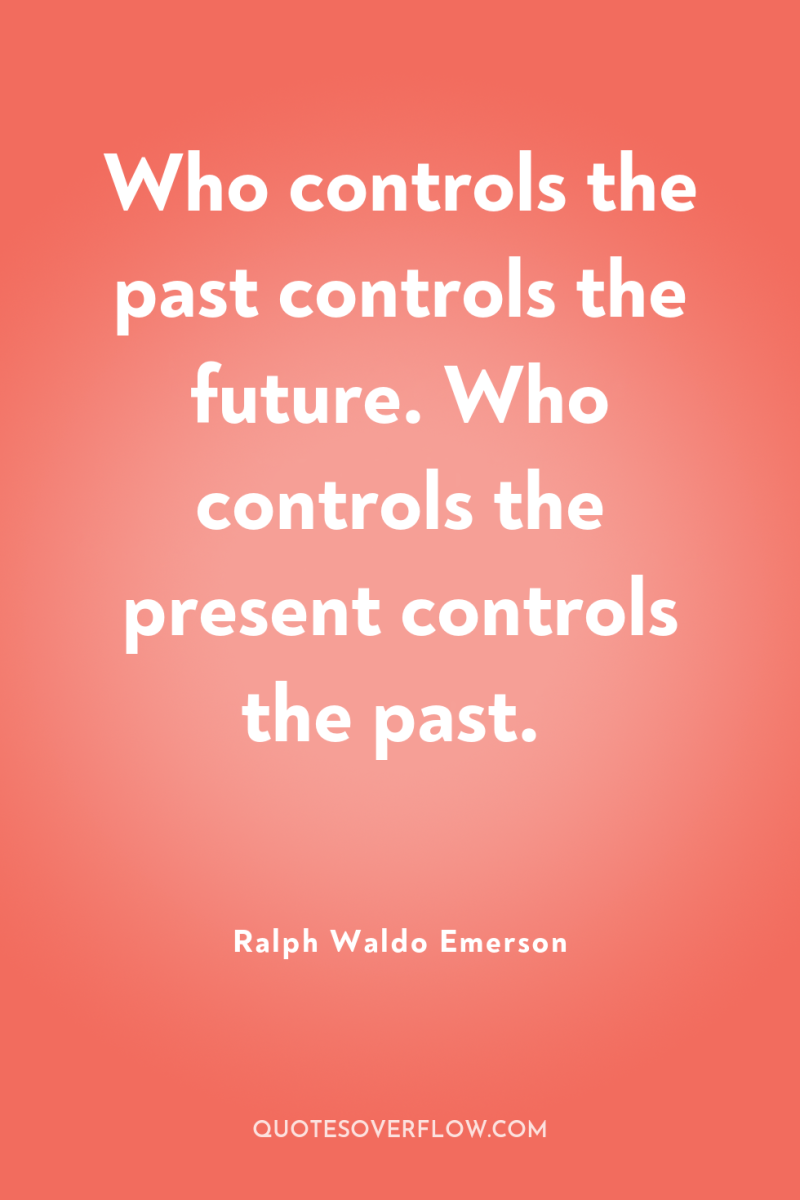
4
Who controls the past controls the future. Who controls the present controls the past.George Orwell
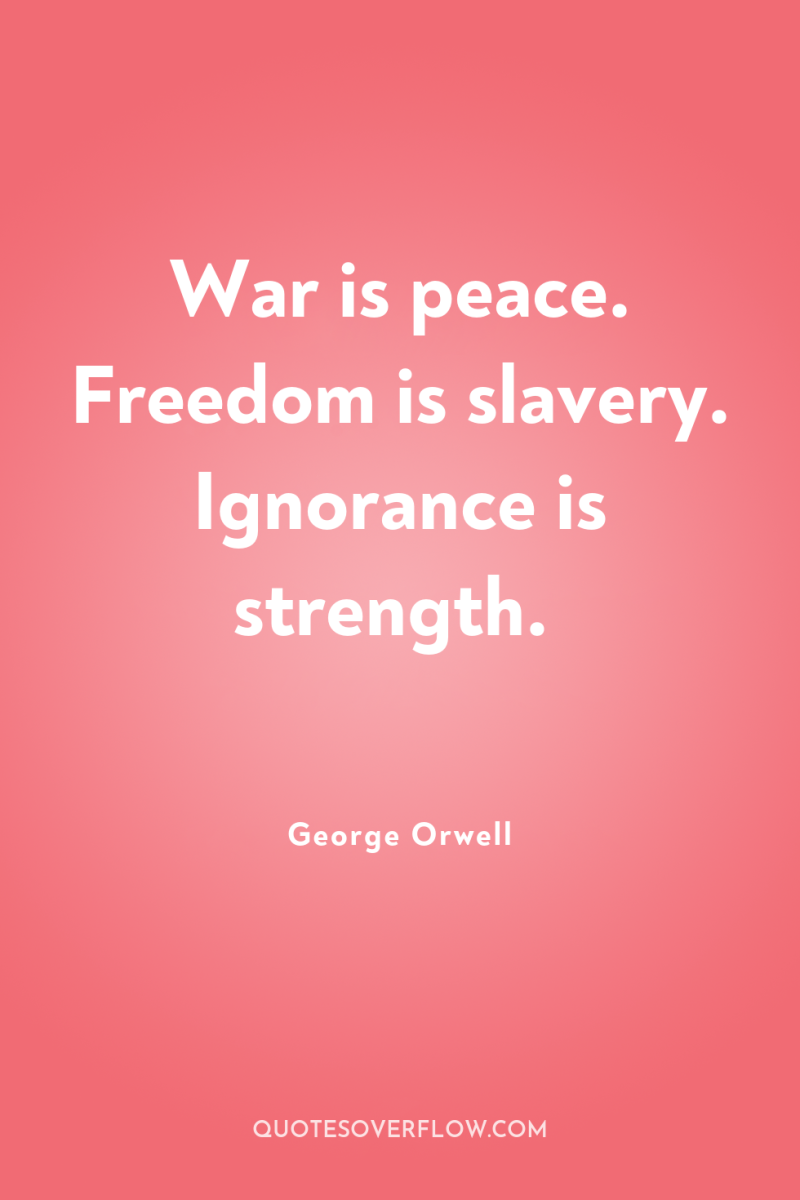
5
War is peace. Freedom is slavery. Ignorance is strength.George Orwell
6
Man is the only creature that consumes without producing. He does not give milk, he does not lay eggs, he is too weak to pull the plough, he cannot run fast enough to catch rabbits. Yet he is lord of all the animals. He sets them to work, he gives back to them the bare minimum that will prevent them from starving, and the rest he keeps for himself.George Orwell
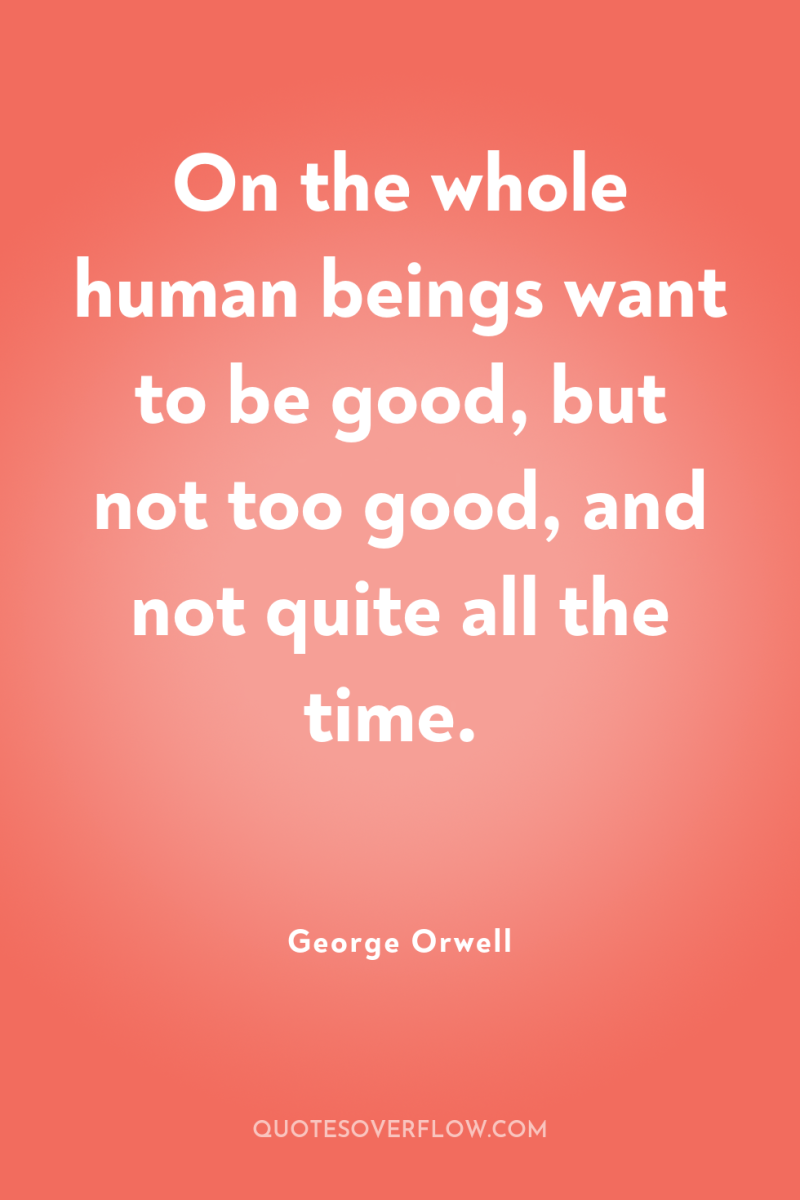
7
On the whole human beings want to be good, but not too good, and not quite all the time.George Orwell
8
For, after all, how do we know that two and two make four? Or that the force of gravity works? Or that the past is unchangeable? If both the past and the external world exist only in the mind, and if the mind itself is controllable — what then?George Orwell
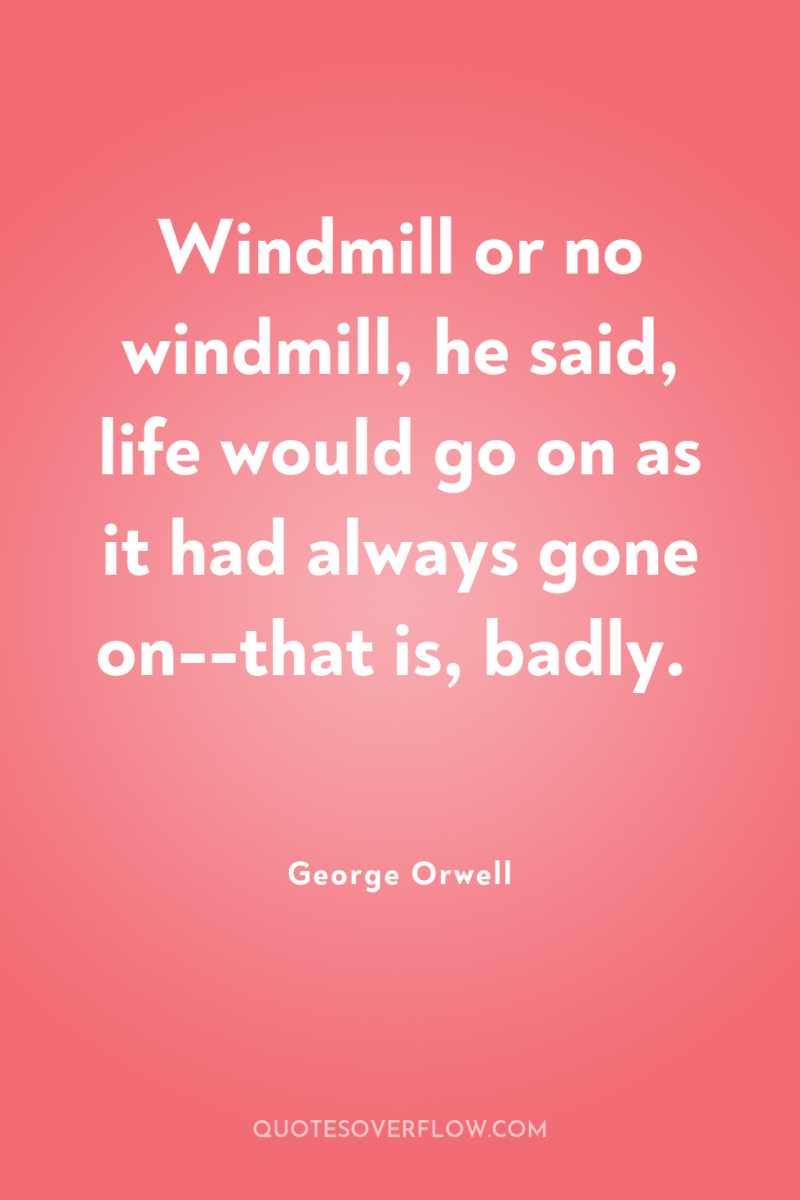
9
Windmill or no windmill, he said, life would go on as it had always gone on--that is, badly.George Orwell
10
He examined the chess problem and set out the pieces. It was a tricky ending, involving a couple of knights.' White to play and mate in two moves.' Winston looked up at the portrait of Big Brother. White always mates, he thought with a sort of cloudy mysticism. Always, without exception, it is so arranged. In no chess problem since the beginning of the world has black ever won. Did it not symbolize the eternal, unvarying triumph of Good over Evil? The huge face gazed back at him, full of calm power. White always mates. .George Orwell
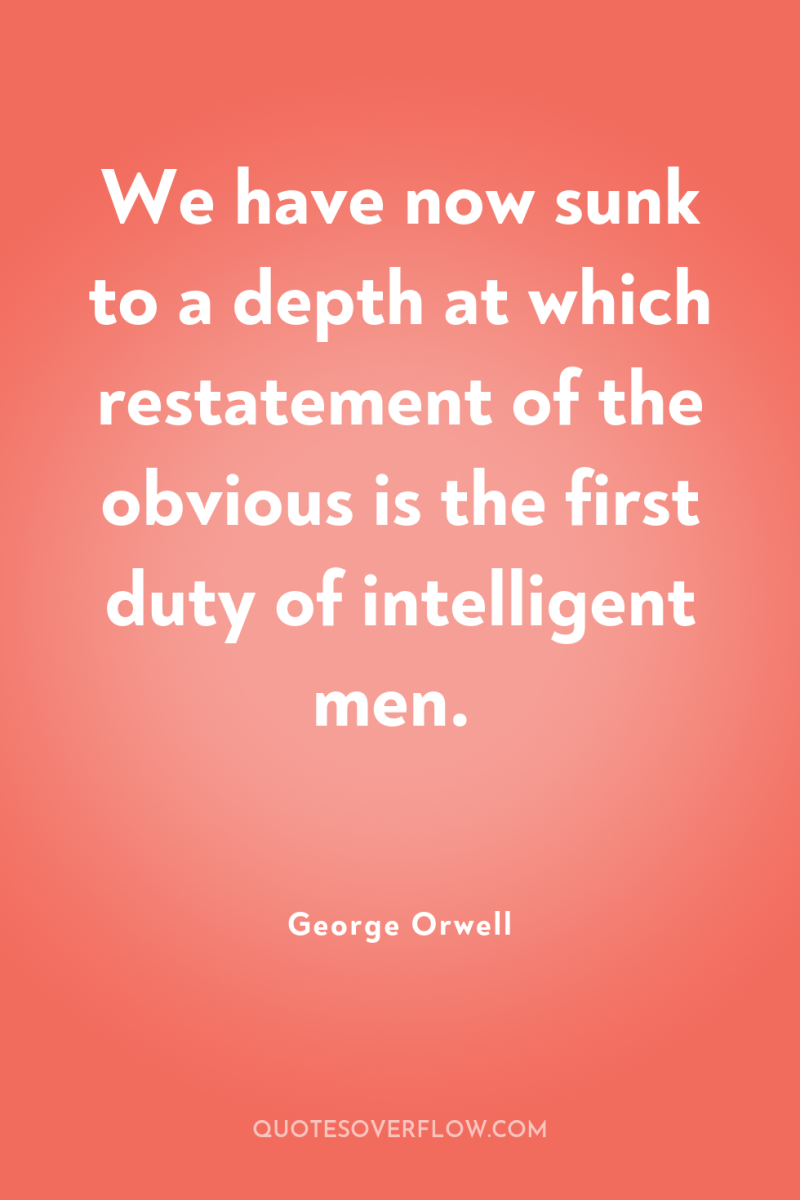
11
We have now sunk to a depth at which restatement of the obvious is the first duty of intelligent men.George Orwell
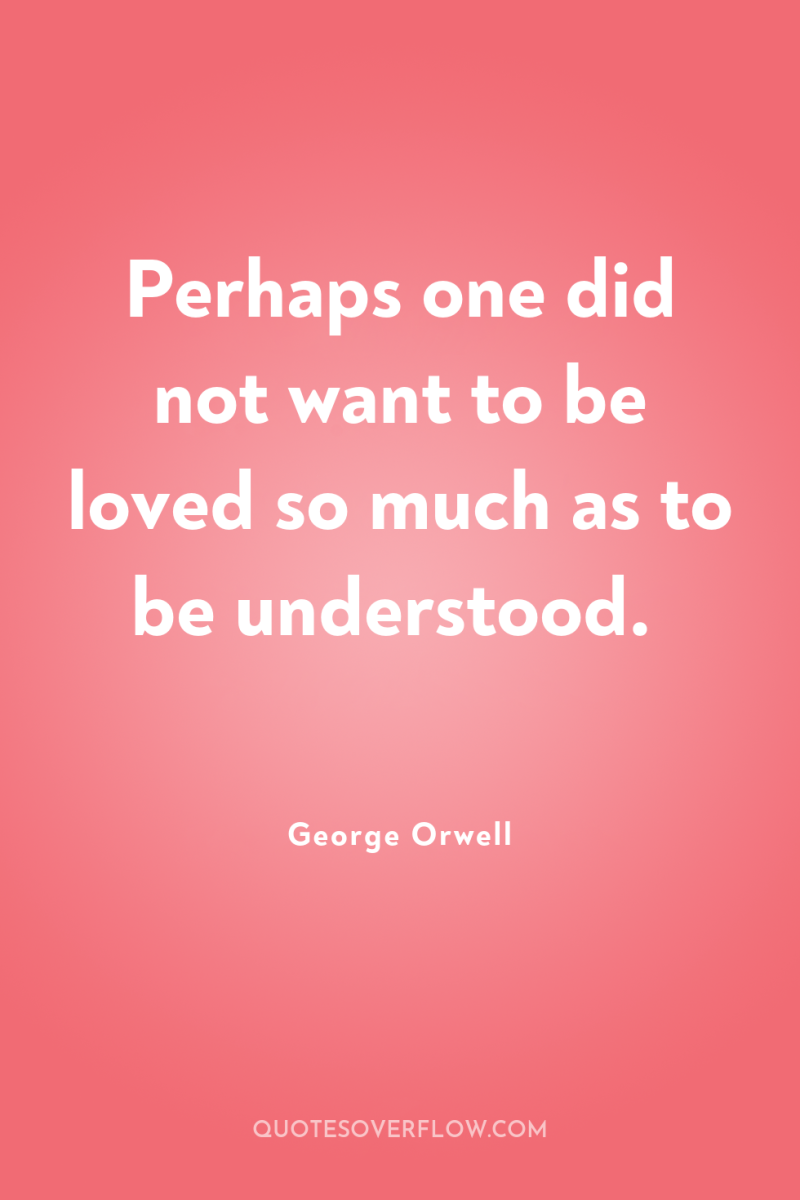
12
Perhaps one did not want to be loved so much as to be understood.George Orwell
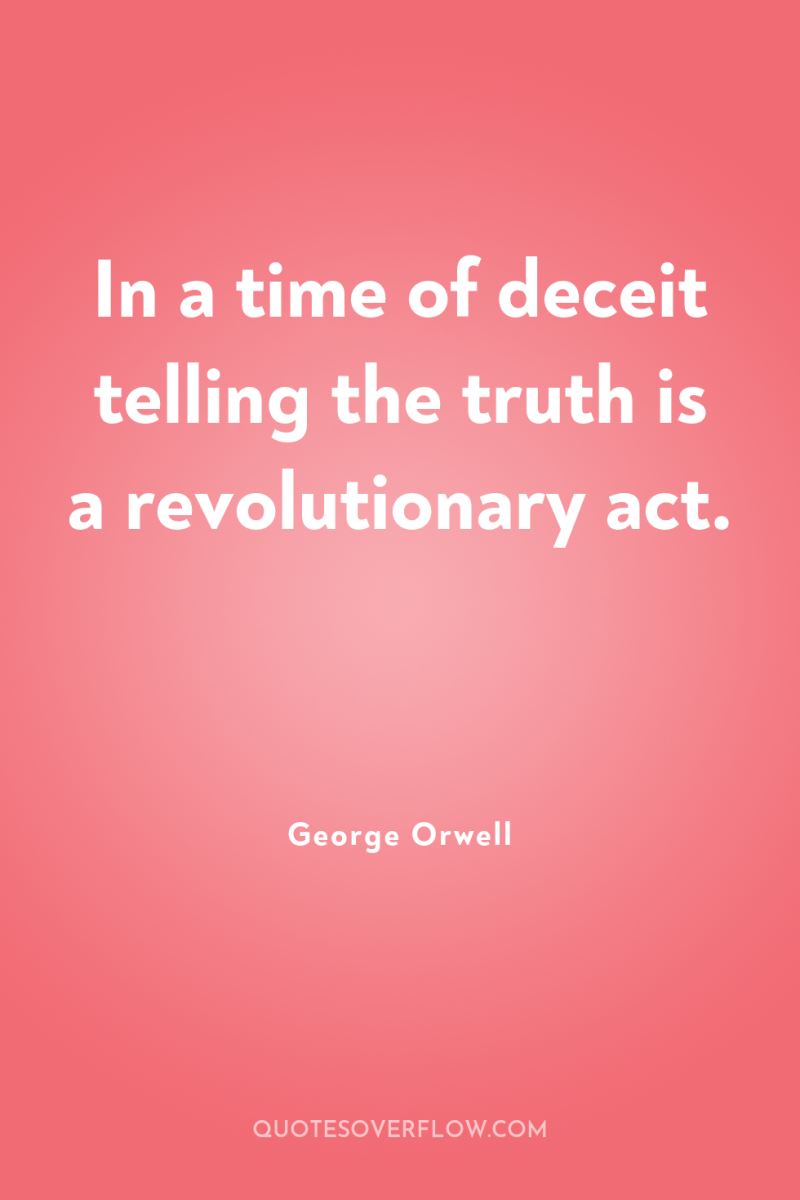
13
In a time of deceit telling the truth is a revolutionary act.George Orwell
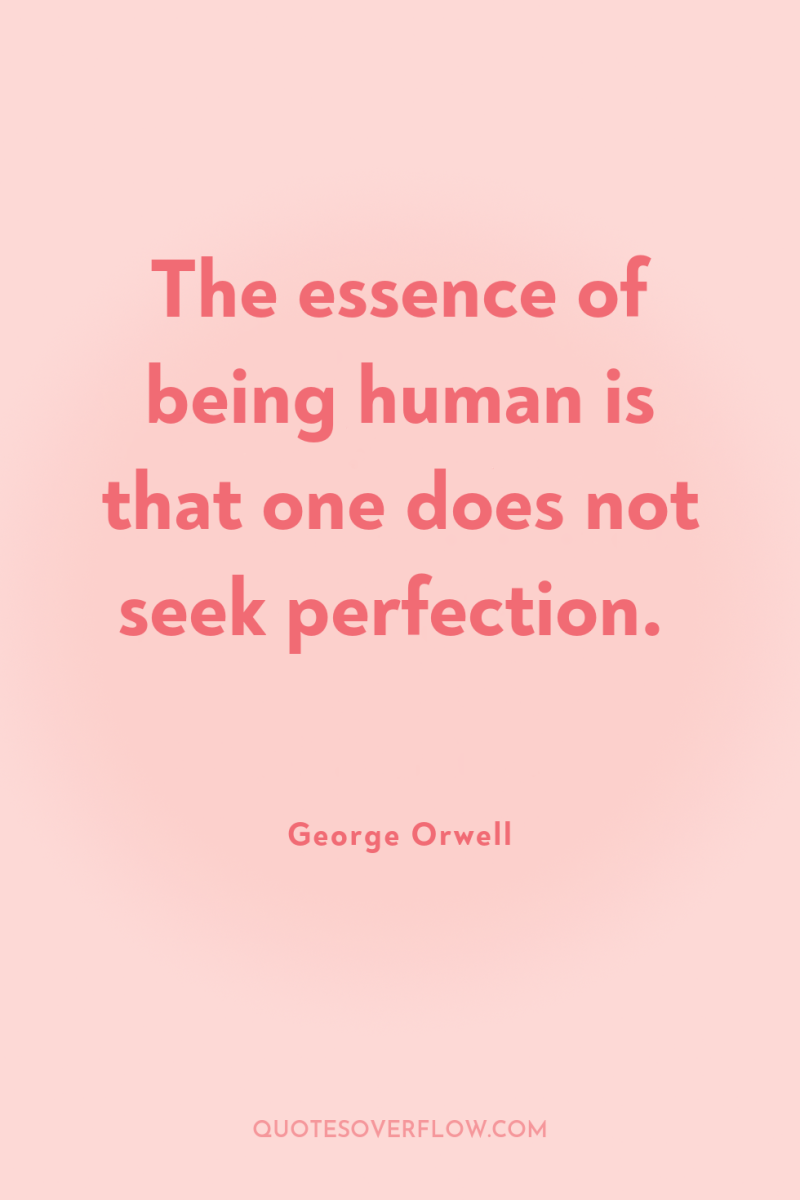
14
The essence of being human is that one does not seek perfection.George Orwell
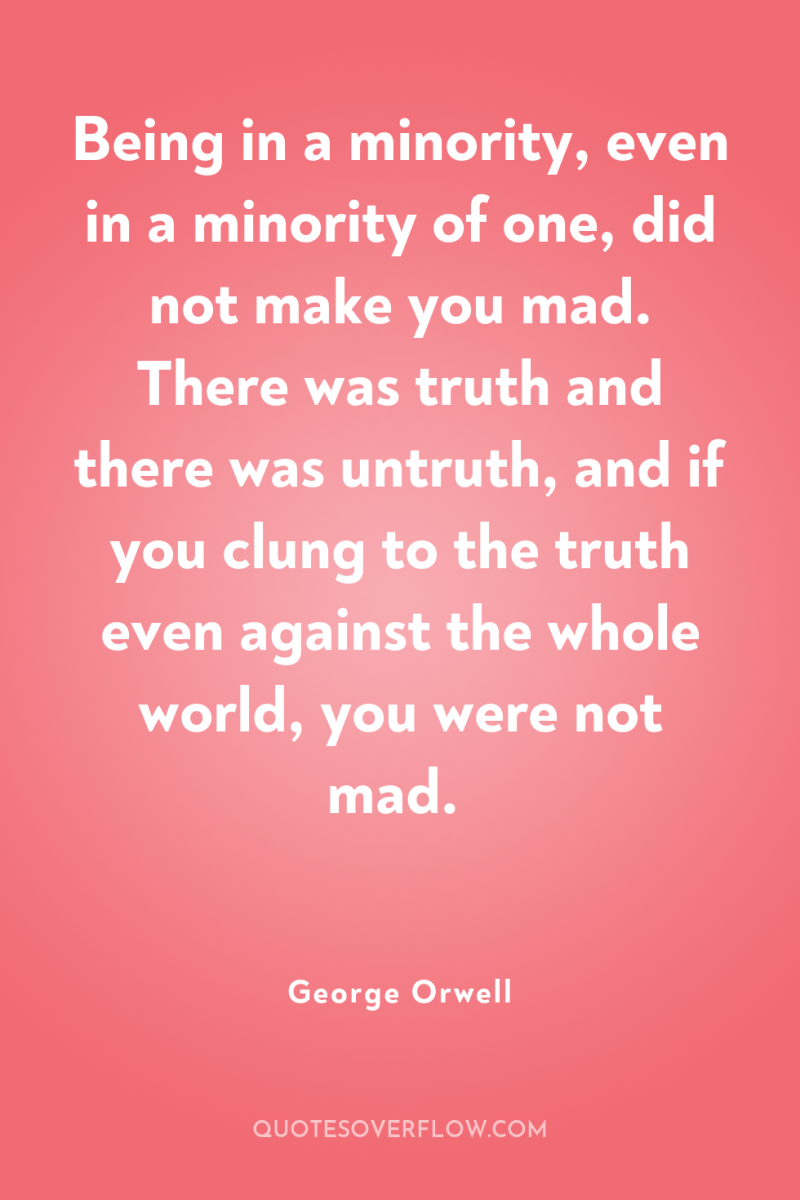
15
Being in a minority, even in a minority of one, did not make you mad. There was truth and there was untruth, and if you clung to the truth even against the whole world, you were not mad.George Orwell
16
To see what is in front of one’s nose needs a constant struggle.George Orwell
17
To know and not to know, to be conscious of complete truthfulness while telling carefully constructed lies, to hold simultaneously two opinions which cancelled out, knowing them to be contradictory and believing in both of them, to use logic against logic, to repudiate morality while laying claim to it, to believe that democracy was impossible and that the Party was the guardian of democracy, to forget whatever it was necessary to forget, then to draw it back into memory again at the moment when it was needed, and then promptly to forget it again: and above all, to apply the same process to the process itself -- that was the ultimate subtlety: consciously to induce unconsciousness, and then, once again, to become unconscious of the act of hypnosis you had just performed. Even to understand the word 'doublethink' involved the use of doublethink.George Orwell
18
To the future or to the past, to a time when thought is free, when men are different from one another and do not live alone– to a time when truth exists and what is done cannot be undone: From the age of uniformity, from the age of solitude, from the age of Big Brother, from the age of doublethink – greetings!George Orwell
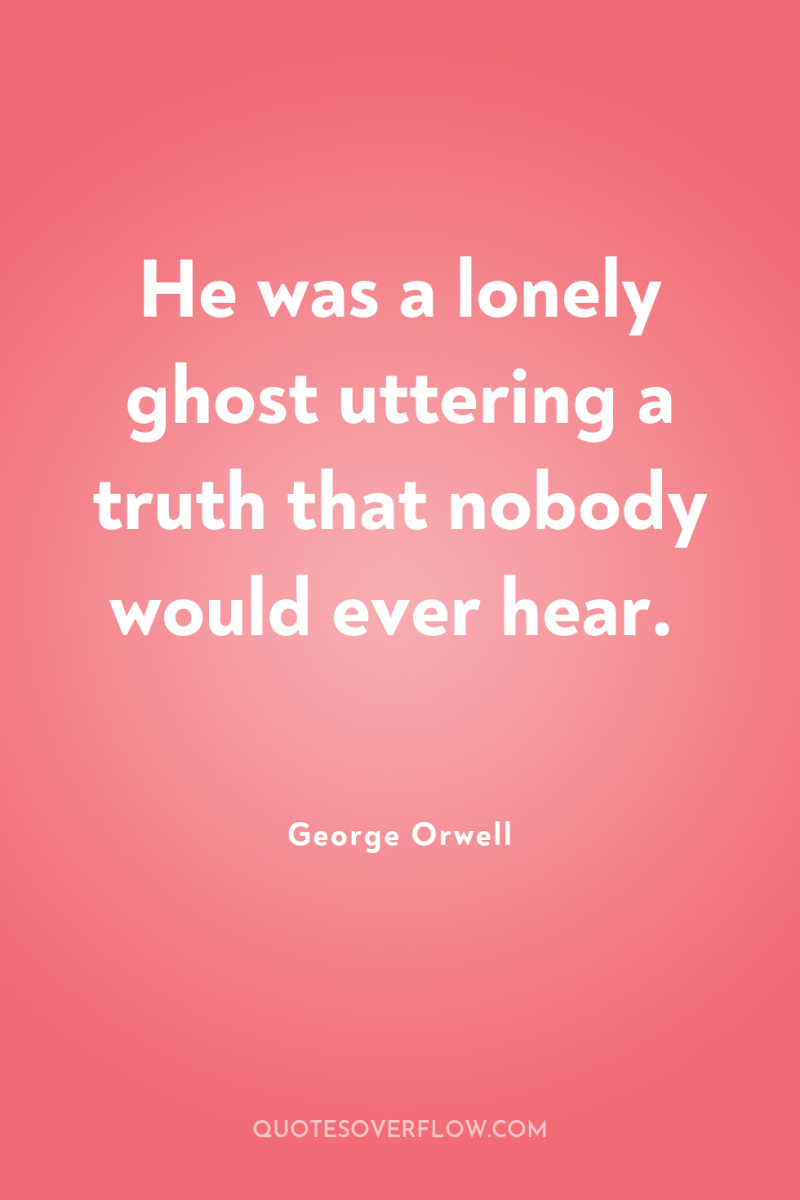
19
He was a lonely ghost uttering a truth that nobody would ever hear.George Orwell

20
All the papers that matter live off their advertisements, and the advertisers exercise an indirect censorship over news.George Orwell
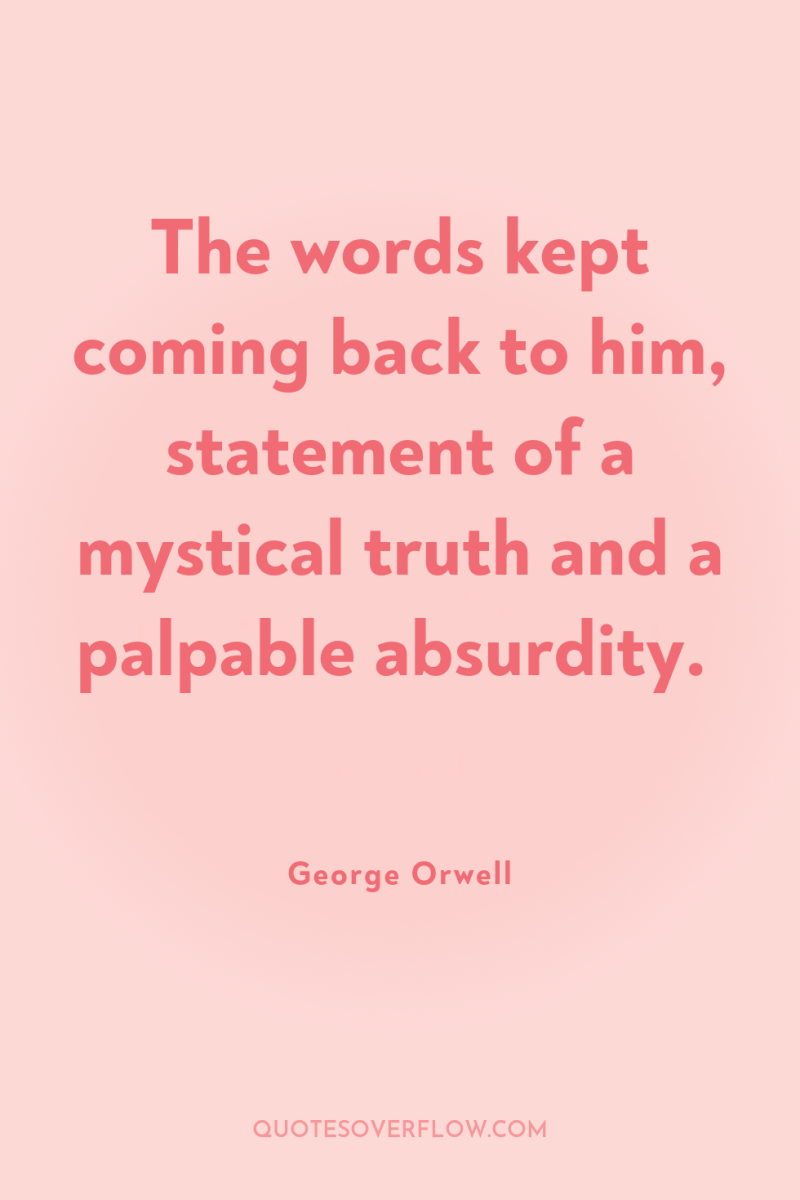
21
The words kept coming back to him, statement of a mystical truth and a palpable absurdity.George Orwell
22
In a way, the world−view of the Party imposed itself most successfully on people incapable of understanding it. They could be made to accept the most flagrant violations of reality, because they never fully grasped the enormity of what was demanded of them, and were not sufficiently interested in public events to notice what was happening. By lack of understanding they remained sane. They simply swallowed everything, and what they swallowed did them no harm, because it left no residue behind, just as a grain of corn will pass undigested through the body of a bird. .George Orwell
23
A writer inevitably - and less directly this applies to all the arts - about contemporary events, and his impulse is to tell what he believes to be truth. But no government, no big organisation, will pay for the truth.George Orwell
24
You don't want to have any pity on these here tramps — scum, they are. You don't want to judge them by the same standards as men like you and me. They're scum, just scum.' It was interesting to see the subtle way in which he disassociated himself from 'these here tramps'. He had been on the road six months, but in the sight of God, he seemed to imply, he was not a tramp. I imagine there are quite a lot of tramps who thank God they are not tramps. They are like the trippers who say such cutting things about trippers.George Orwell
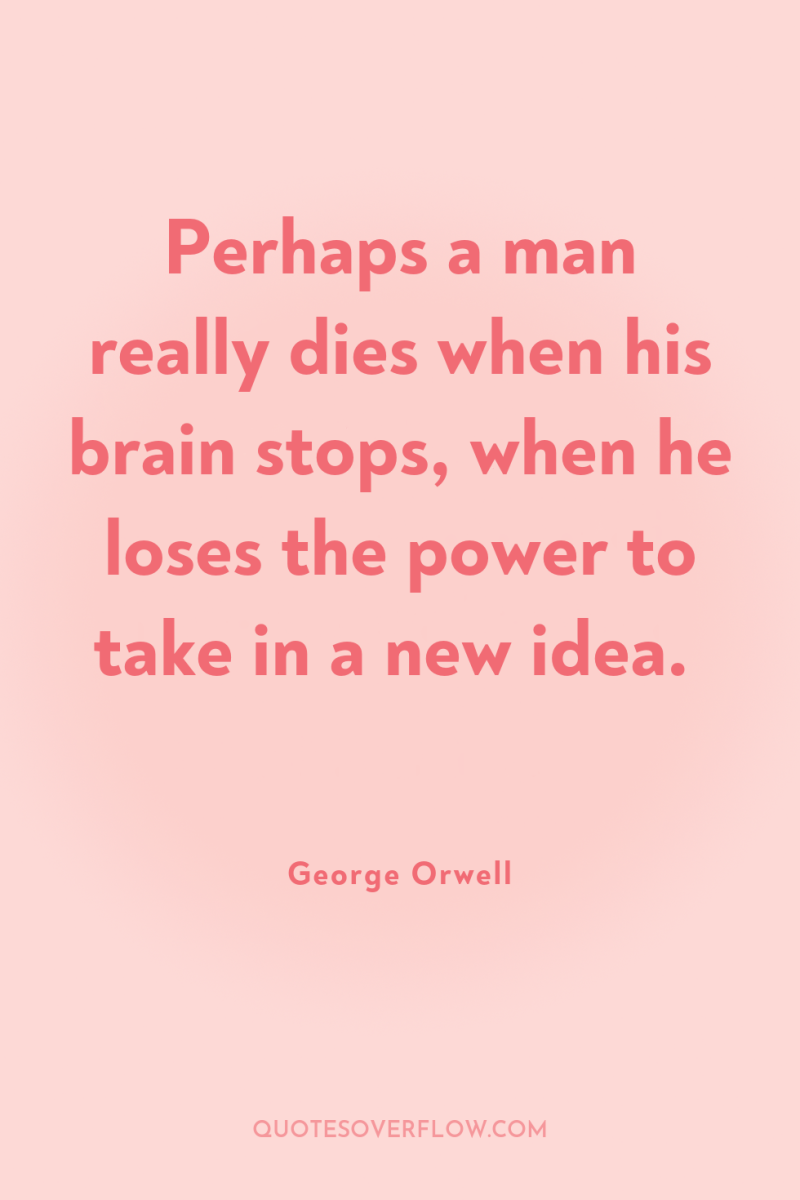
25
Perhaps a man really dies when his brain stops, when he loses the power to take in a new idea.George Orwell
26
At any given moment there is an orthodoxy, a body of ideas of which it is assumed that all right-thinking people will accept without question. It is not exactly forbidden to say this, that or the other, but it is “not done” to say it… Anyone who challenges the prevailing orthodoxy finds himself silenced with surprising effectiveness. A genuinely unfashionable opinion is almost never given a fair hearing, either in the popular press or in the high-brow periodicals.George Orwell
27
But if there was hope, it lay in the proles. You had to cling on to that. When you put it in words it sounded reasonable: it was when you looked at the human beings passing you on the pavement that it became an act of faith.George Orwell
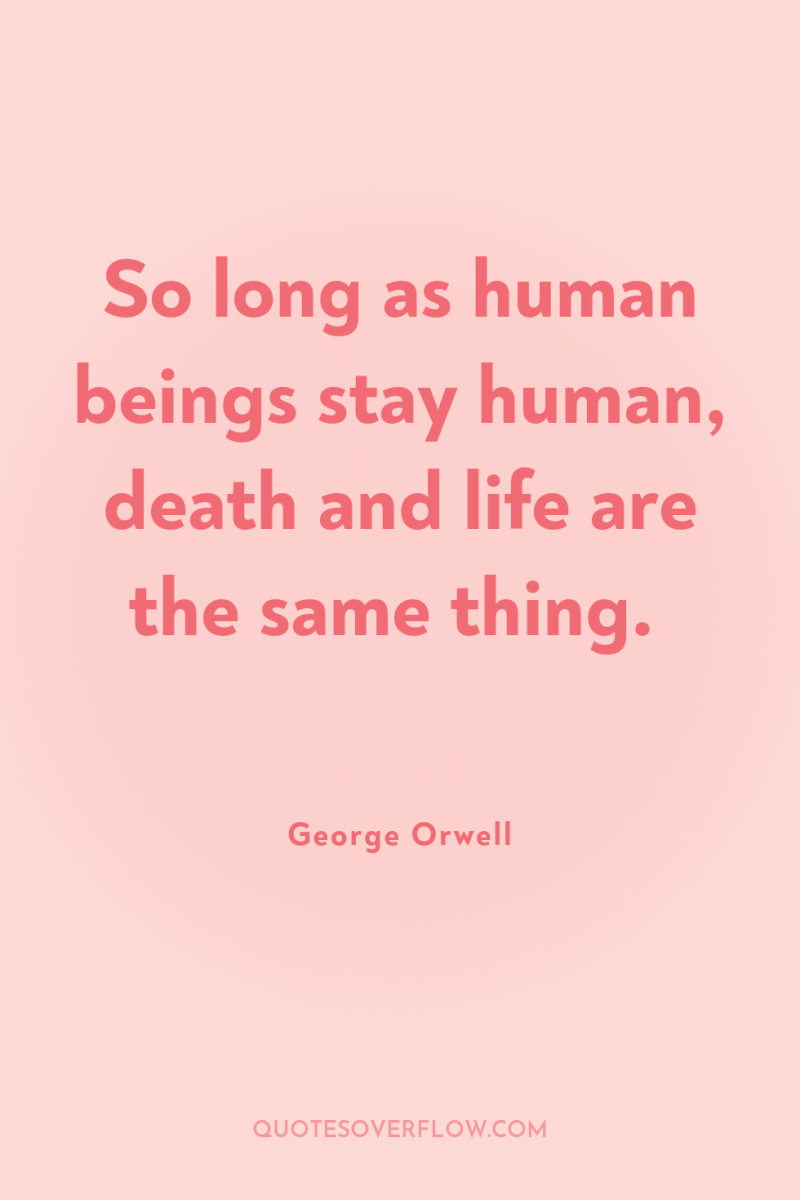
28
So long as human beings stay human, death and life are the same thing.George Orwell
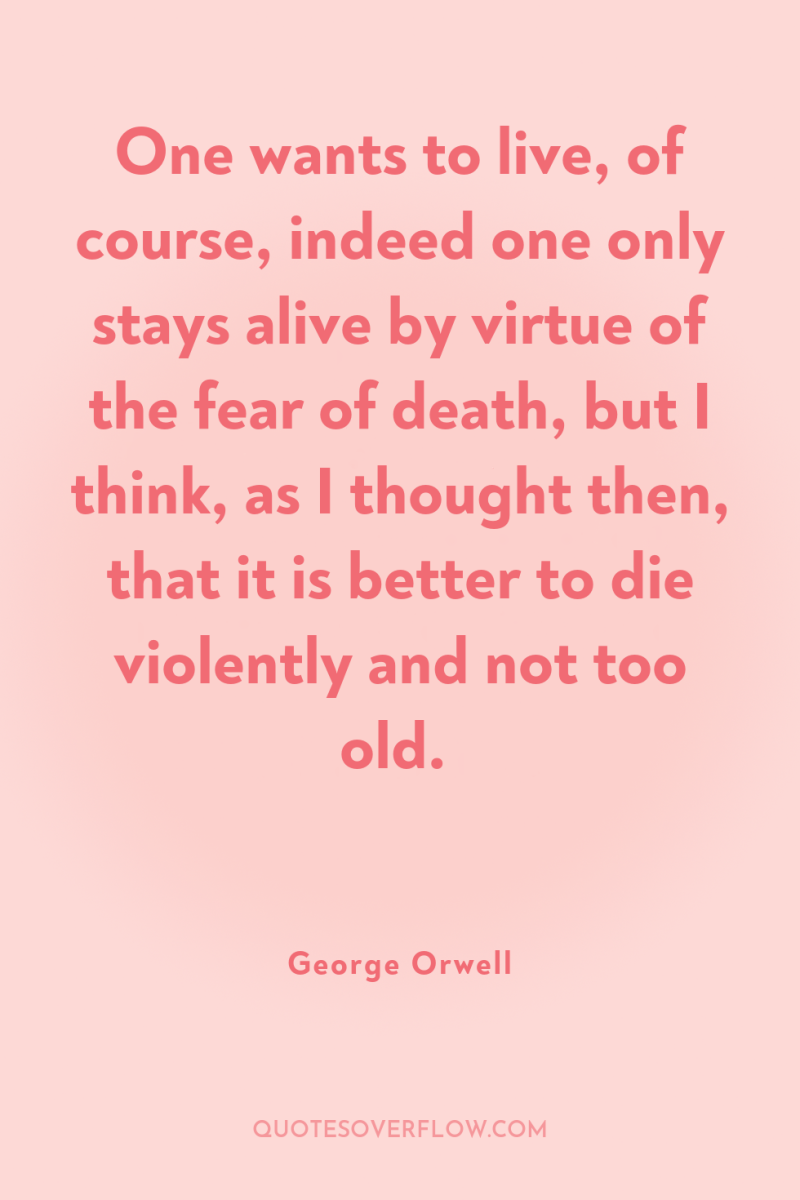
29
One wants to live, of course, indeed one only stays alive by virtue of the fear of death, but I think, as I thought then, that it is better to die violently and not too old.George Orwell
30
I am afraid of death. You are young, so presumably you're more afraid of it than I am. Obviously we shall put if off as long as we can. But it makes very little difference. So long as human beings stay human, death and life are the same thing.George Orwell
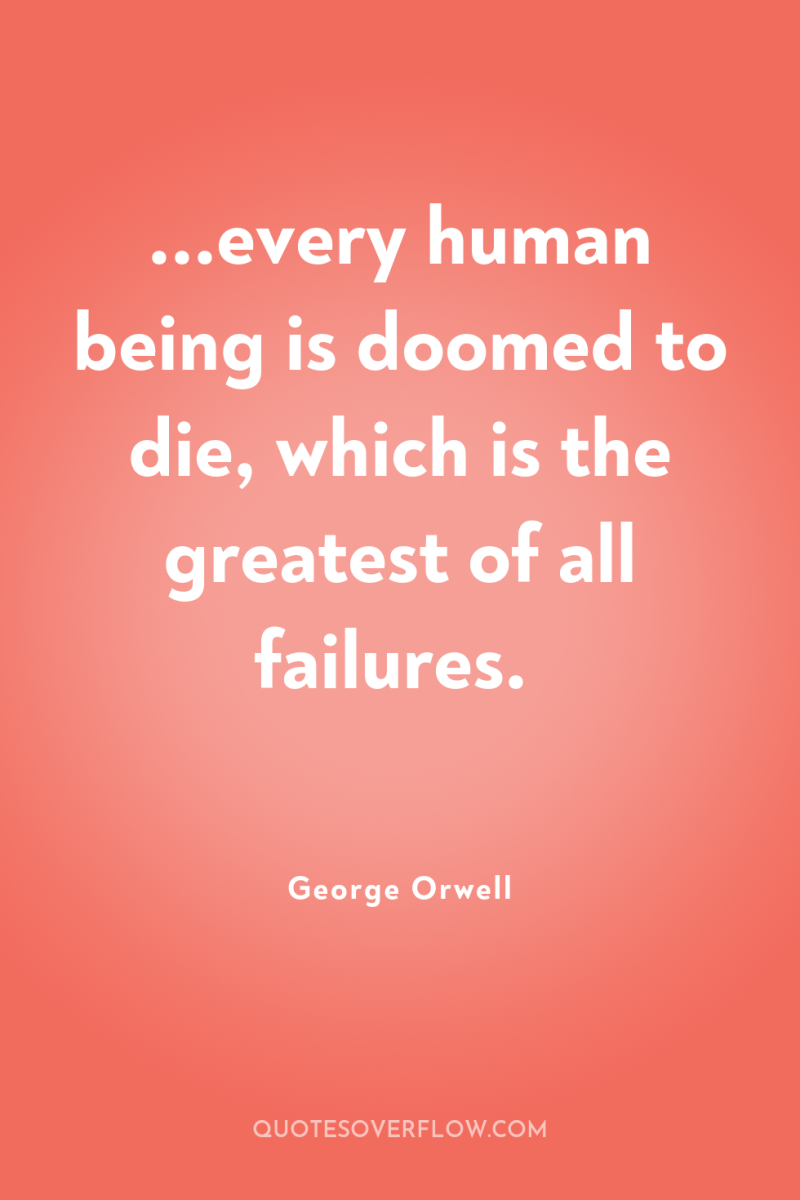
31
...every human being is doomed to die, which is the greatest of all failures.George Orwell
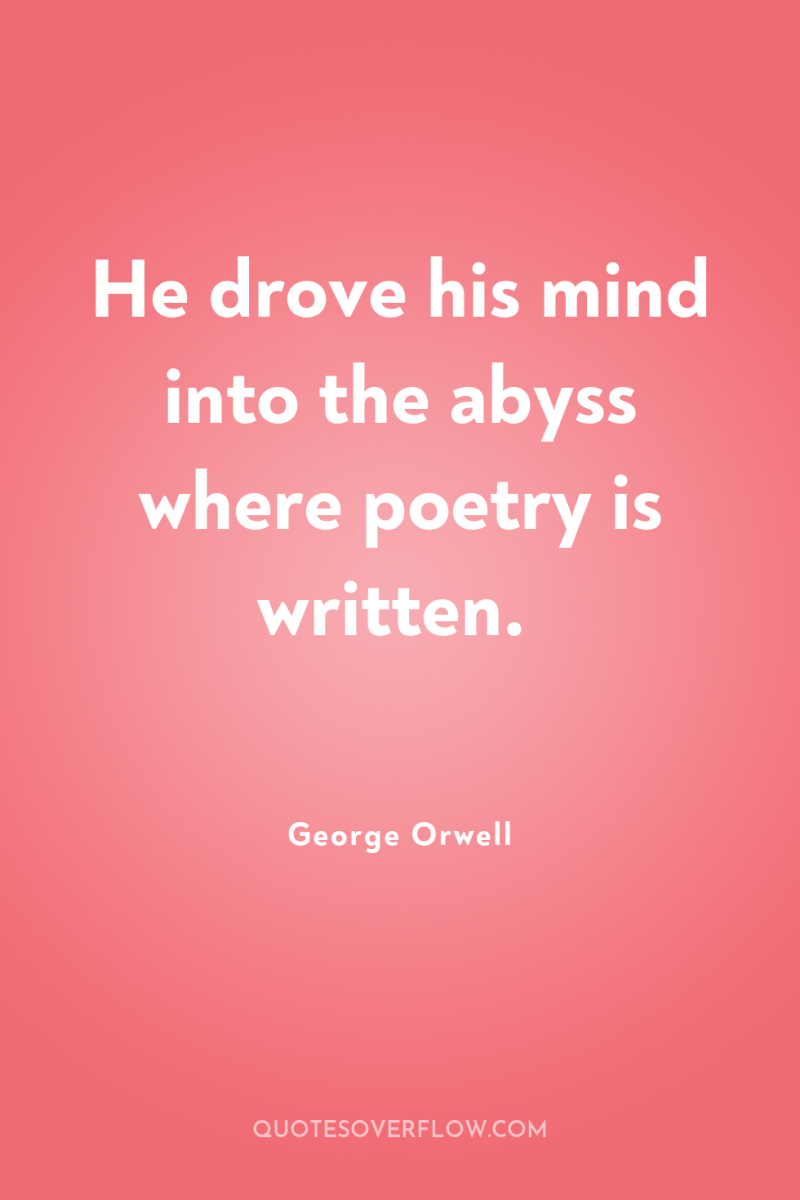
32
He drove his mind into the abyss where poetry is written.George Orwell
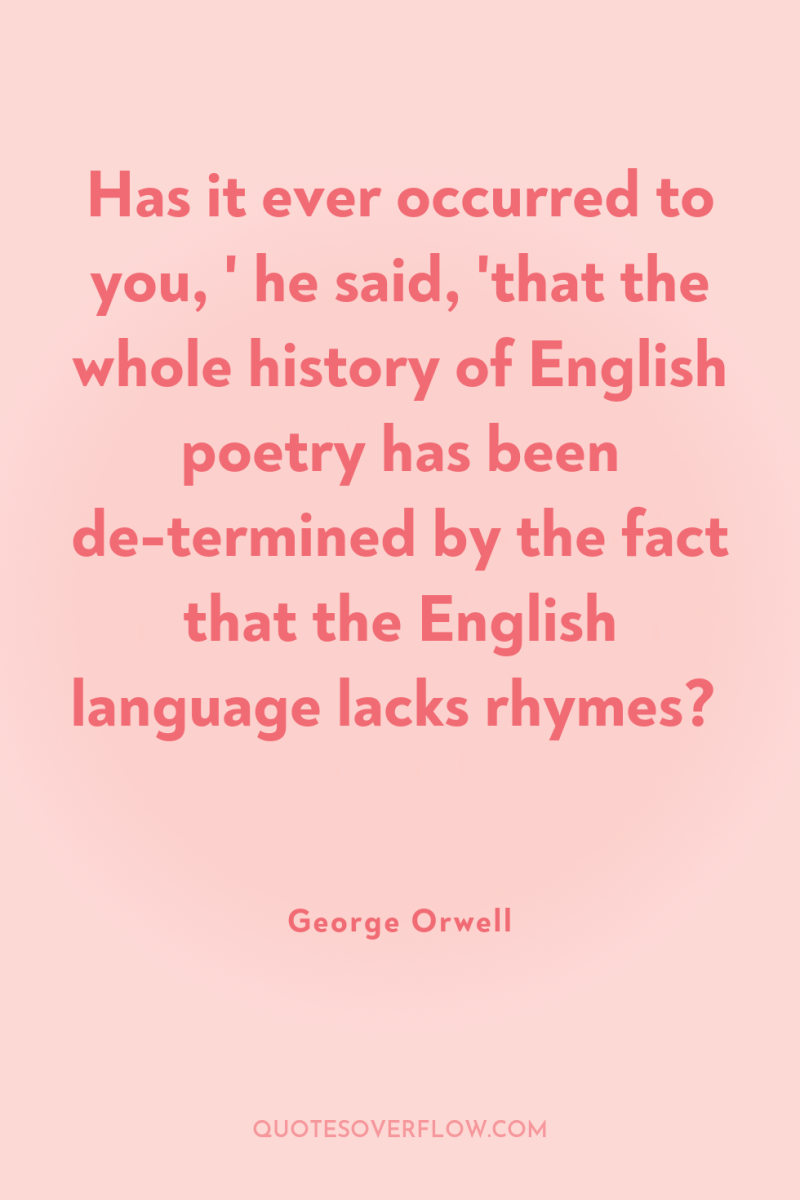
33
Has it ever occurred to you, ' he said, 'that the whole history of English poetry has been de-termined by the fact that the English language lacks rhymes?George Orwell
34
For if in careless summer days In groves of Ashtaroth we whored, Repentant now, when winds blow cold, We kneel before our rightful lord; The lord of all, the money-god, Who rules us blood and hand and brain, Who gives the roof that stops the wind, And, giving, takes away again; Who spies with jealous, watchful care, Our thoughts, our dreams, our secret ways, Who picks our words and cuts our clothes, And maps the pattern of our days; Who chills our anger, curbs our hope, And buys our lives and pays with toys, Who claims as tribute broken faith, Accepted insults, muted joys; Who binds with chains the poet’s wit, The navvy’s strength, the soldier’s pride, And lays the sleek, estranging shield Between the lover and his bride.George Orwell
35
Spring, spring! Bytuene Mershe ant Averil, when spray biginneth to spring! When shaws be sheene and swards full fayre, and leaves both large and longe! When the hounds of spring are on winter’s traces, in the spring time, the only pretty ring time, when the birds do sing, hey-ding-a-ding ding, cuckoo, jug-jug, pu-wee, ta-witta-woo! And so on and so on and so on. See almost any poet between the Bronze Age and 1805.George Orwell
36
Writing a book is a horrible, exhausting struggle, like a long bout with some painful illness. One would never undertake such a thing if one were not driven on by some demon whom one can neither resist nor understand.George Orwell
37
A scrupulous writer, in every sentence that he writes, will ask himself at least four questions, thus: 1. What am I trying to say? 2. What words will express it? 3. What image or idiom will make it clearer? 4. Is this image fresh enough to have an effect?George Orwell
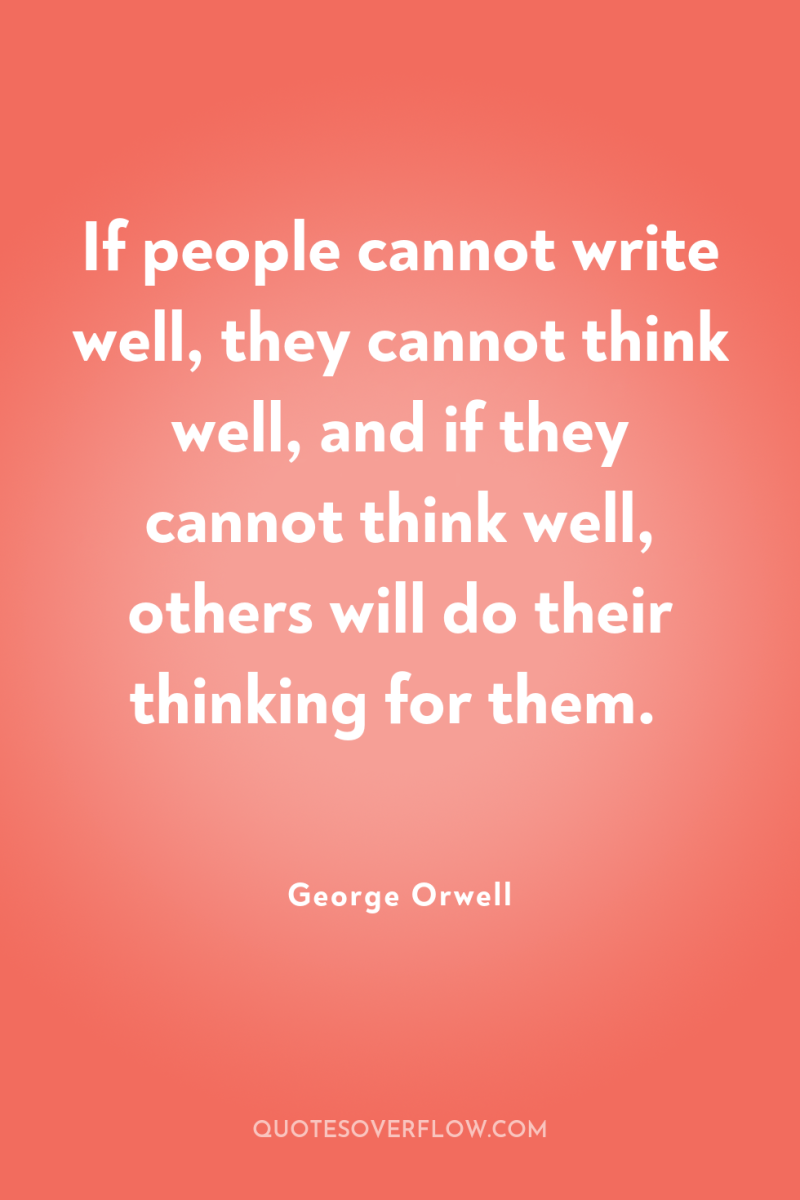
38
If people cannot write well, they cannot think well, and if they cannot think well, others will do their thinking for them.George Orwell
39
All writers are vain, selfish and lazy, and at the very bottom of their motives lies a mystery. Writing a book is a long, exhausting struggle, like a long bout of some painful illness. One would never undertake such a thing if one were not driven by some demon whom one can neither resist nor understand.George Orwell
40
To write or even speak English is not a science but an art. There are no reliable words. Whoever writes English is involved in a struggle that never lets up even for a sentence. He is struggling against vagueness, against obscurity, against the lure of the decorative adjective, against the encroachment of Latin and Greek, and, above all, against the worn-out phrases and dead metaphors with which the language is cluttered up. .George Orwell
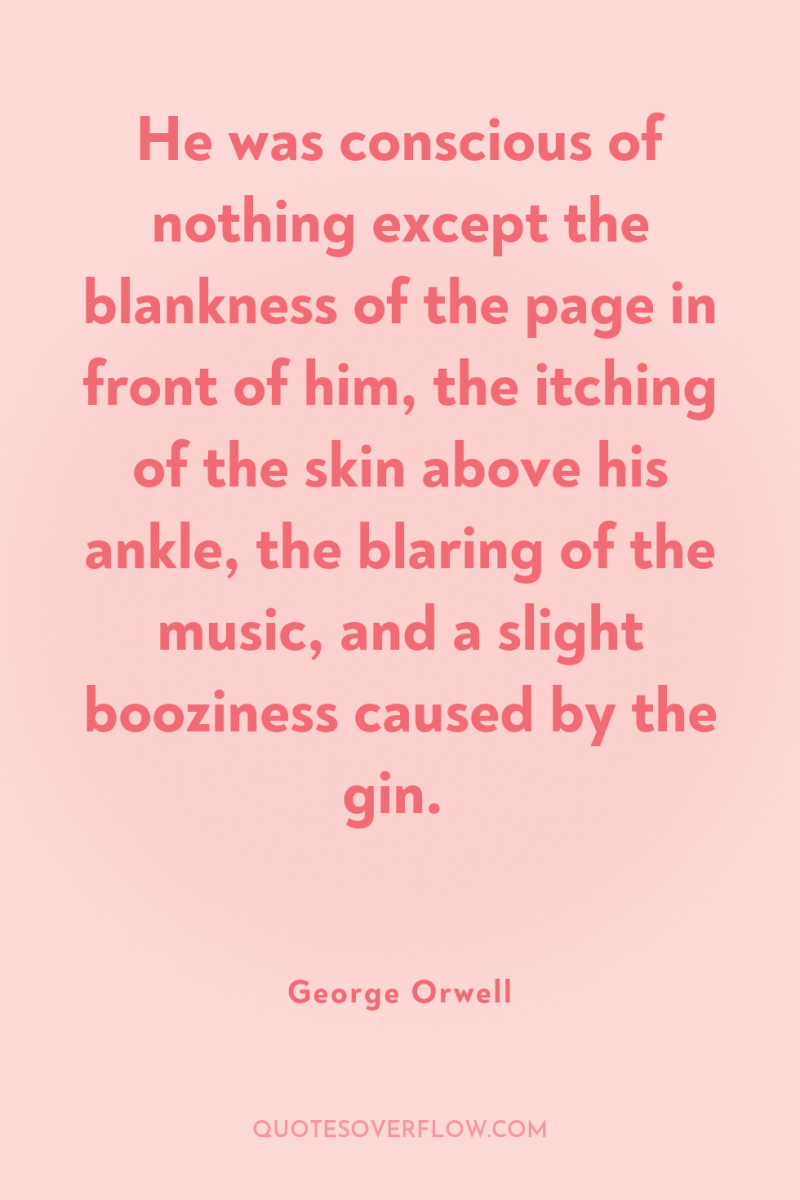
41
He was conscious of nothing except the blankness of the page in front of him, the itching of the skin above his ankle, the blaring of the music, and a slight booziness caused by the gin.George Orwell
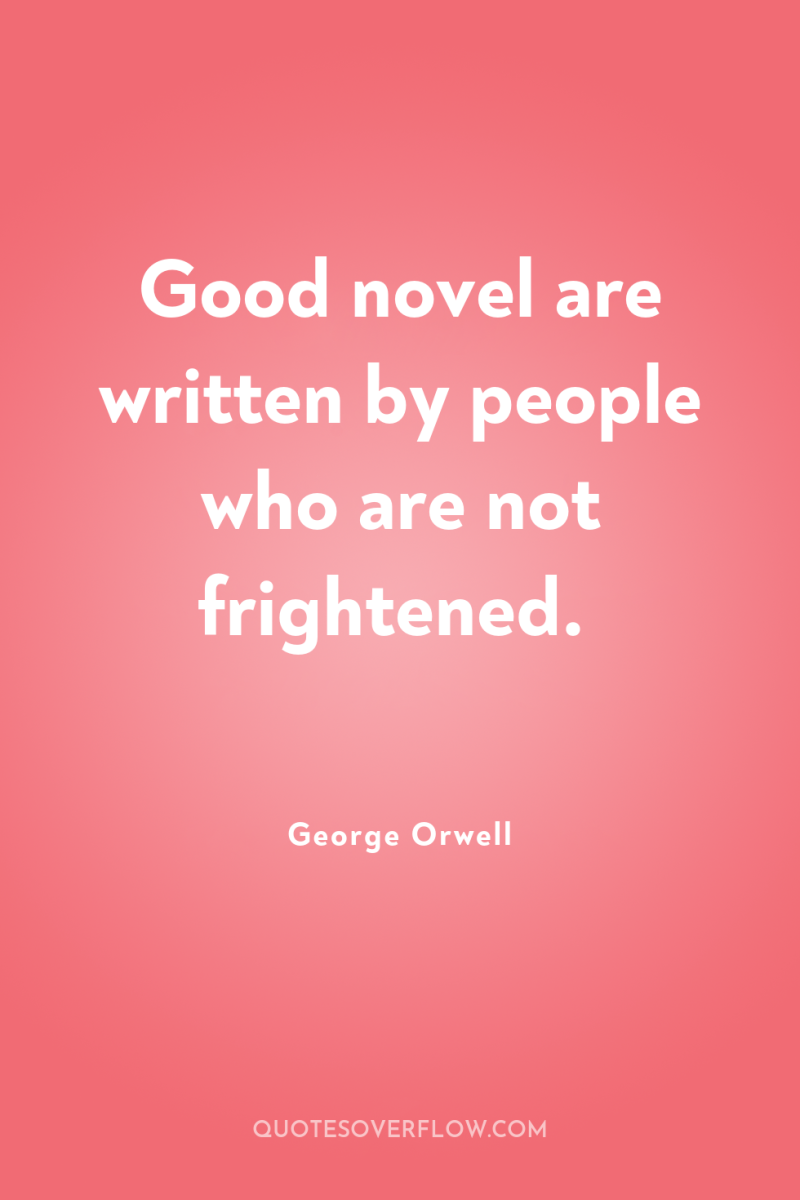
42
Good novel are written by people who are not frightened.George Orwell
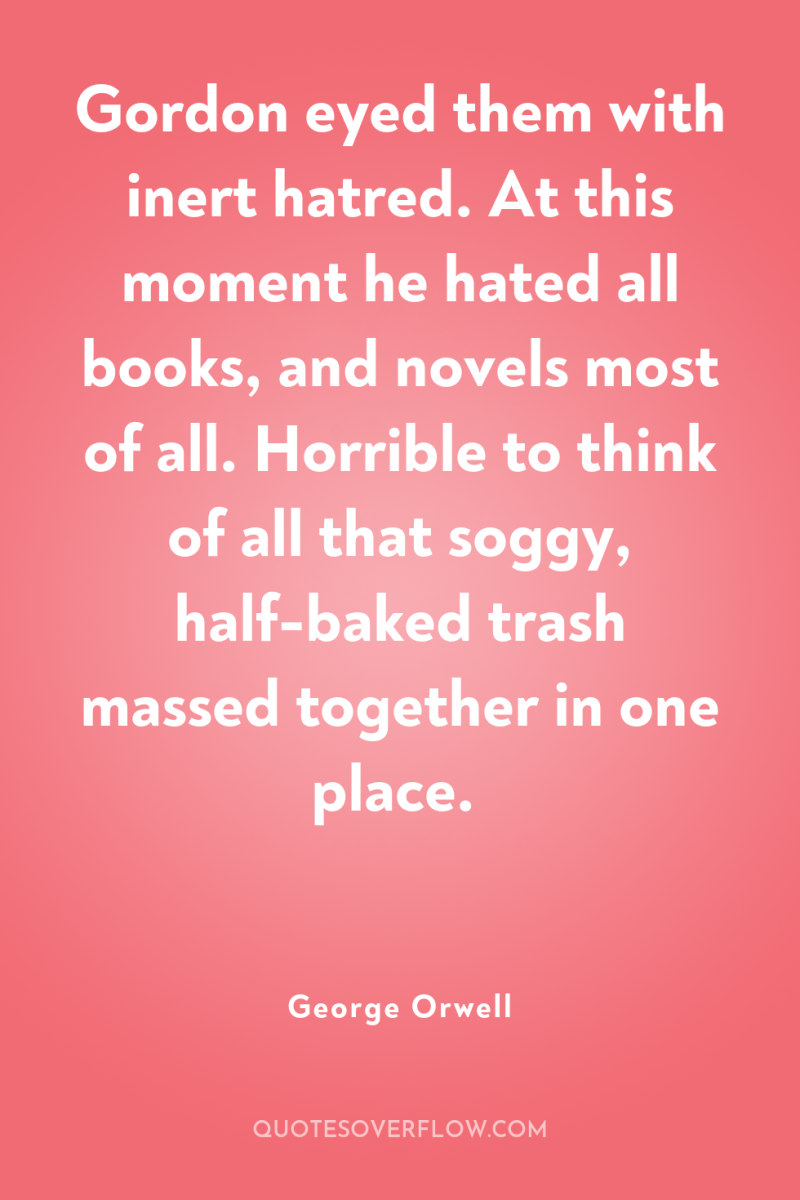
43
Gordon eyed them with inert hatred. At this moment he hated all books, and novels most of all. Horrible to think of all that soggy, half-baked trash massed together in one place.George Orwell
44
All writers are vain, selfish, and lazy, and at the very bottom of their motives there lies a mystery. Writing a book is a horrible, exhausting struggle, like a long bout of some painful illness. One would never undertake such a thing if one were not driven on by some demon whom one can neither resist nor understand. For all one knows that demon is simply the same instinct that makes a baby squall for attention. And yet it is also true that one can write nothing readable unless one constantly struggles to efface one's own personality. Good prose is like a windowpane.George Orwell

45
Good prose should be transparent, like a window pane.George Orwell
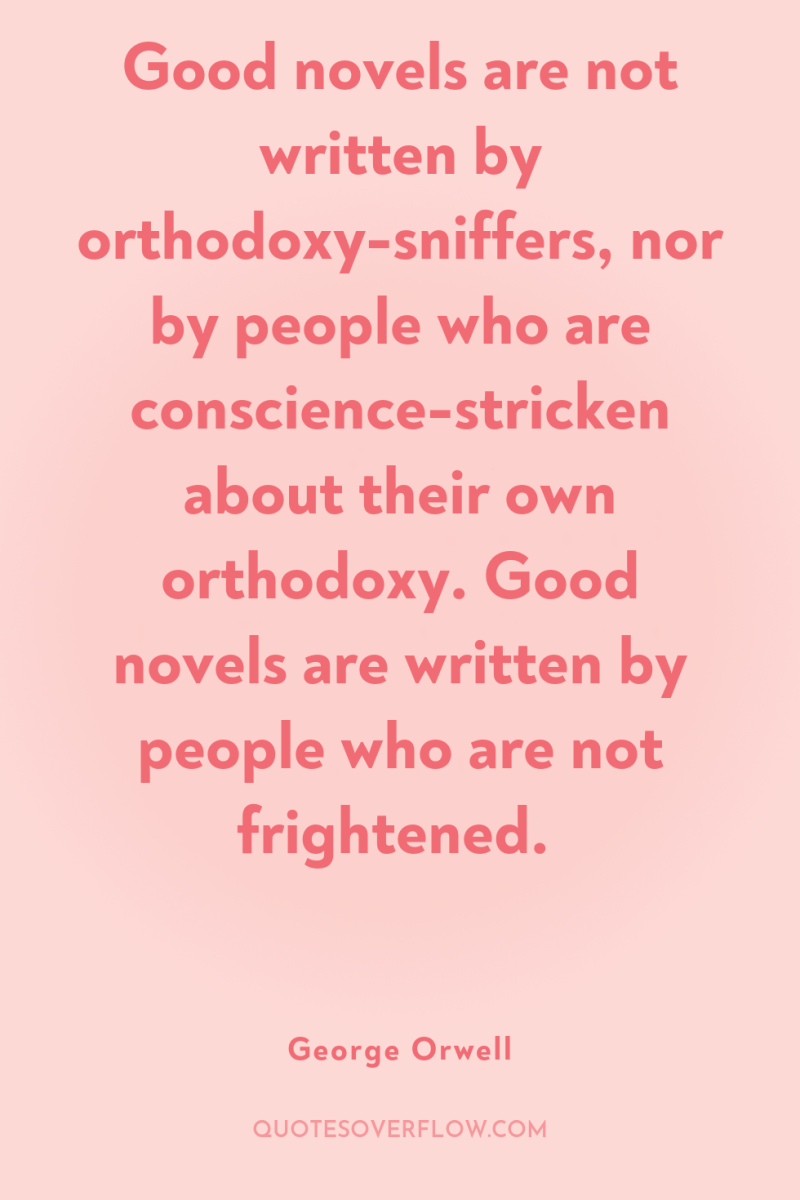
46
Good novels are not written by orthodoxy-sniffers, nor by people who are conscience-stricken about their own orthodoxy. Good novels are written by people who are not frightened.George Orwell
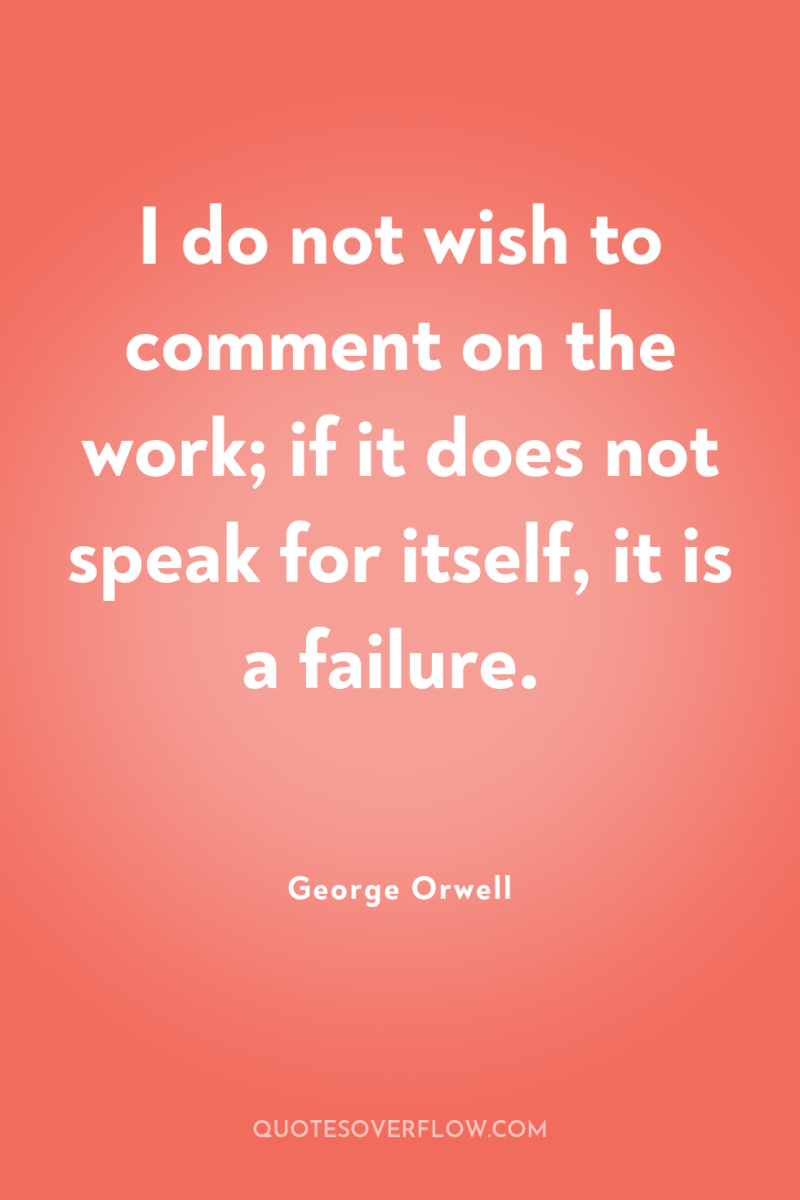
47
I do not wish to comment on the work; if it does not speak for itself, it is a failure.George Orwell
48
I do not think one can assess a writer’s motives without knowing something of his early development. His subject matter will be determined by the age he lives in ... but before he ever begins to write he will have acquired an emotional attitude from which he will never completely escape.George Orwell
49
What he realised, and more clearly as time went on, was that money-worship has been elevated into a religion. Perhaps it is the only real religion-the only felt religion-that is left to us. Money is what God used to be. Good and evil have no meaning any longer except failure and success. Hence the profoundly significant phrase, to make good. The decalogue has been reduced to two commandments. One for the employers-the elect, the money priesthood as it were- 'Thou shalt make money'; the other for the employed- the slaves and underlings'- 'Thou shalt not lose thy job.' It was about this time that he came across The Ragged Trousered Philanthropists and read about the starving carpenter who pawns everything but sticks to his aspidistra. The aspidistra became a sort of symbol for Gordon after that. The aspidistra, the flower of England! It ought to be on our coat of arms instead of the lion and the unicorn. There will be no revolution in England while there are aspidistras in the windows. .George Orwell
50
At present nothing is possible except to extend the area of sanity little by little. We cannot act collectively. We can only spread our knowledge outwards from individual to individual, generation after generation.George Orwell
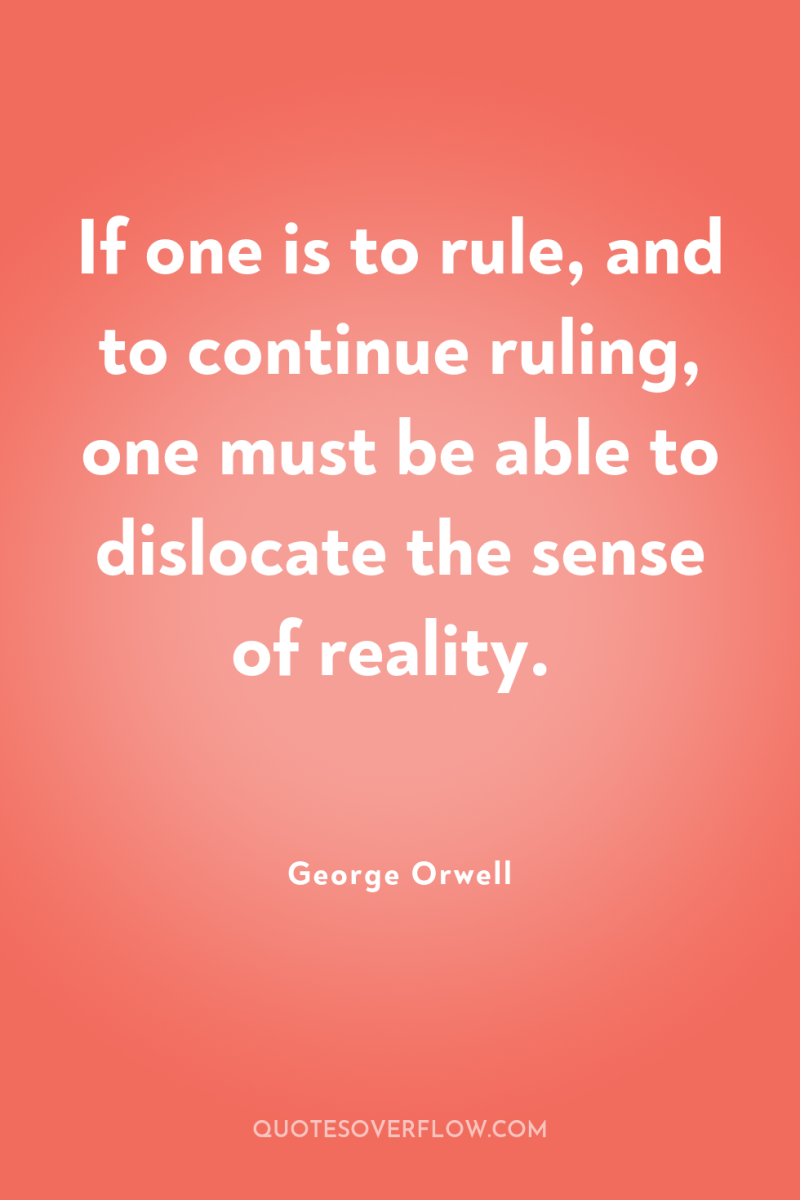
51
If one is to rule, and to continue ruling, one must be able to dislocate the sense of reality.George Orwell

52
The best books... are those that tell you what you know already.George Orwell
53
There are books that one reads over and over again, books that become part of the furniture of one’s mind and alter one’s whole attitude to life, books that one dips into but never reads through, books that one reads at a single sitting and forgets a week later:George Orwell
54
And if our book consumption remains as low as it has been, at least let us admit that it is because reading is a less exciting pastime than going to the dogs, the pictures or the pub, and not because books, whether bought or borrowed, are too expensive.George Orwell
55
Sometimes they threaten you with something - something you can't stand up to, can't even think about. And then you say, "Don't do it to me, do it to somebody else, do it to So-and-so." And perhaps you might pretend, afterwards, that it was only a trick and that you just said it to make them stop and didn't mean it. But that isn't true. At the time when it happens you do mean it. You think there's no other way of saving yourself, and you're quite ready to save yourself that way. You WANT it to happen to the other person. You don't give a damn what they suffer. All you care is yourself.George Orwell
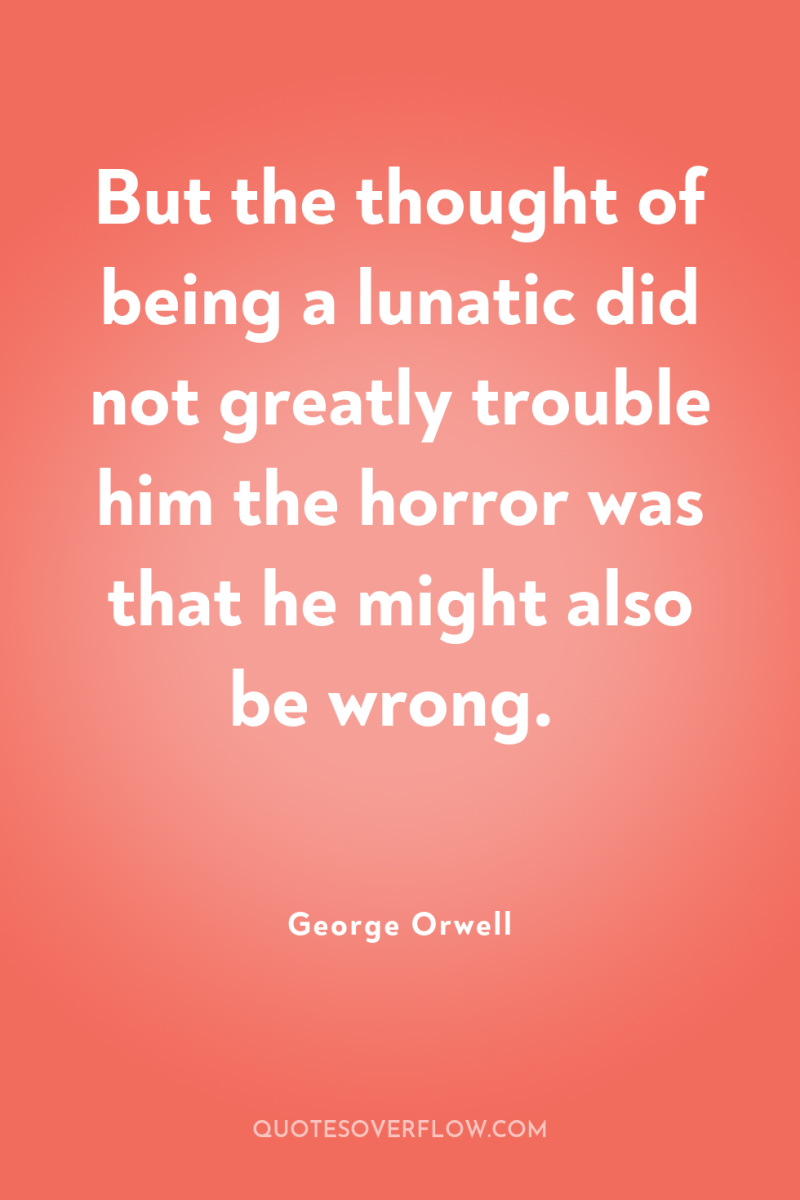
56
But the thought of being a lunatic did not greatly trouble him the horror was that he might also be wrong.George Orwell
57
He thought with a kind of astonishment of the biological uselessness of pain and fear, the treachery of the human body which always freezes into inertia at exactly the moment when a special effort is needed. He might have silenced the dark-haired girl if only he had acted quickly enough; but precisely because of the extremity of danger he had lost the power to act. It struck him that in moments of crisis one is never fighting against an external enemy but always against one's own body. Even now, in spite of the gin, the dull ache in his belly made consecutive thought impossible. And it is the same, he percieved, in all seemingly heroic or tragic situatuions. On the battlefield, in the torture chamber, on a sinking ship, the issues that you are fighting for are always forgotten, because the body swells up until it fills the universe, and even when you are not paralyzed by fright or screaming with pain, life is a moment-to-moment struggle against hunger or cold or sleeplessness, against a sour stomach or an aching tooth.George Orwell
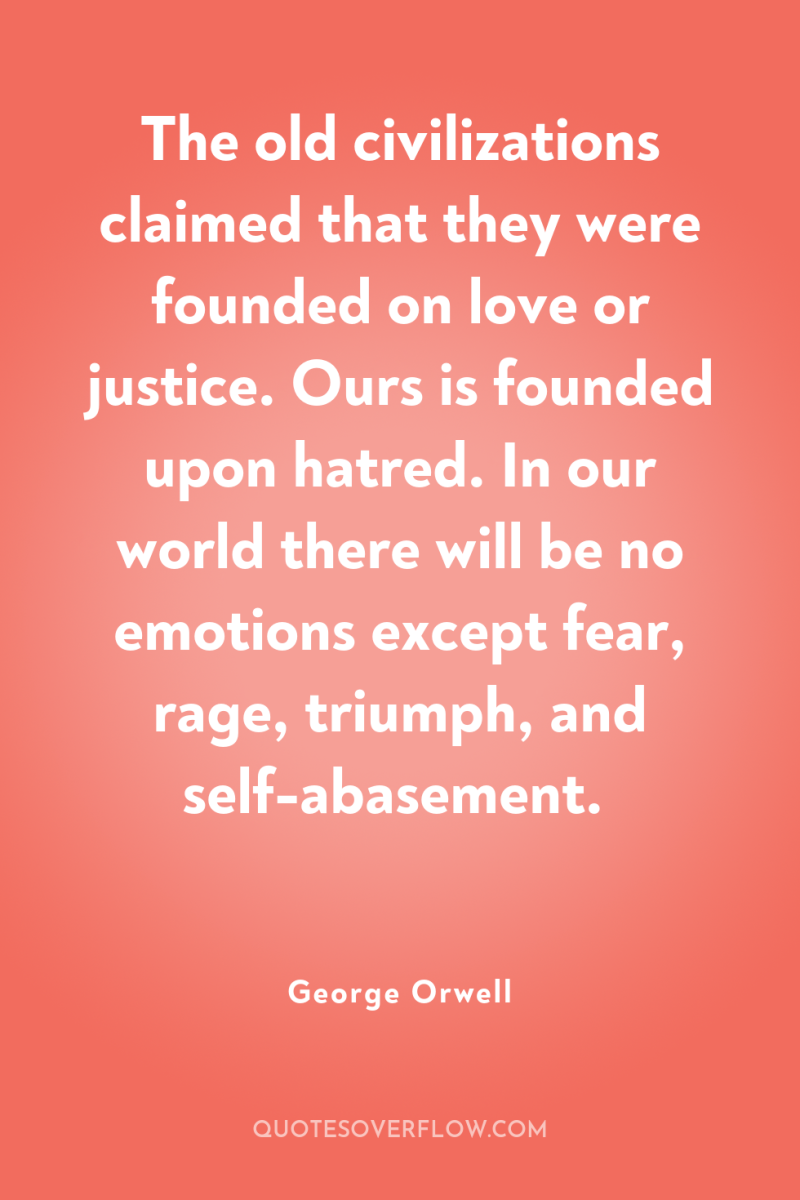
58
The old civilizations claimed that they were founded on love or justice. Ours is founded upon hatred. In our world there will be no emotions except fear, rage, triumph, and self-abasement.George Orwell
59
It was intended that when Newspeak had been adopted once and for all and Oldspeak forgotten, a heretical thought - that is, a thought diverging from the principles of Ingsoc - should be literally unthinkable, at least so far as thought is dependent on words.George Orwell
60
Tragedy, he precieved, belonged to the ancient time, to a time when there were still privacy, love, and friendship, and when the members of a family stood by one another without needing to know the reason.George Orwell
61
Pacifism is objectively pro-fascist. This is elementary common sense. If you hamper the war effort of one side, you automatically help out that of the other. Nor is there any real way of remaining outside such a war as the present one. In practice, 'he that is not with me is against me'.George Orwell
62
The majority of pacifists either belong to obscure religious sects or are simply humanitarians who object to taking life and prefer not to follow their thoughts beyond that point. But there is a minority of intellectual pacifists, whose real though unacknowledged motive appears to be hatred of western democracy and admiration for totalitarianism. Pacifist propaganda usually boils down to saying that one side is as bad as the other, but if one looks closely at the writing of the younger intellectual pacifists, one finds that they do not by any means express impartial disapproval but are directed almost entirely against Britain and the United States … .George Orwell
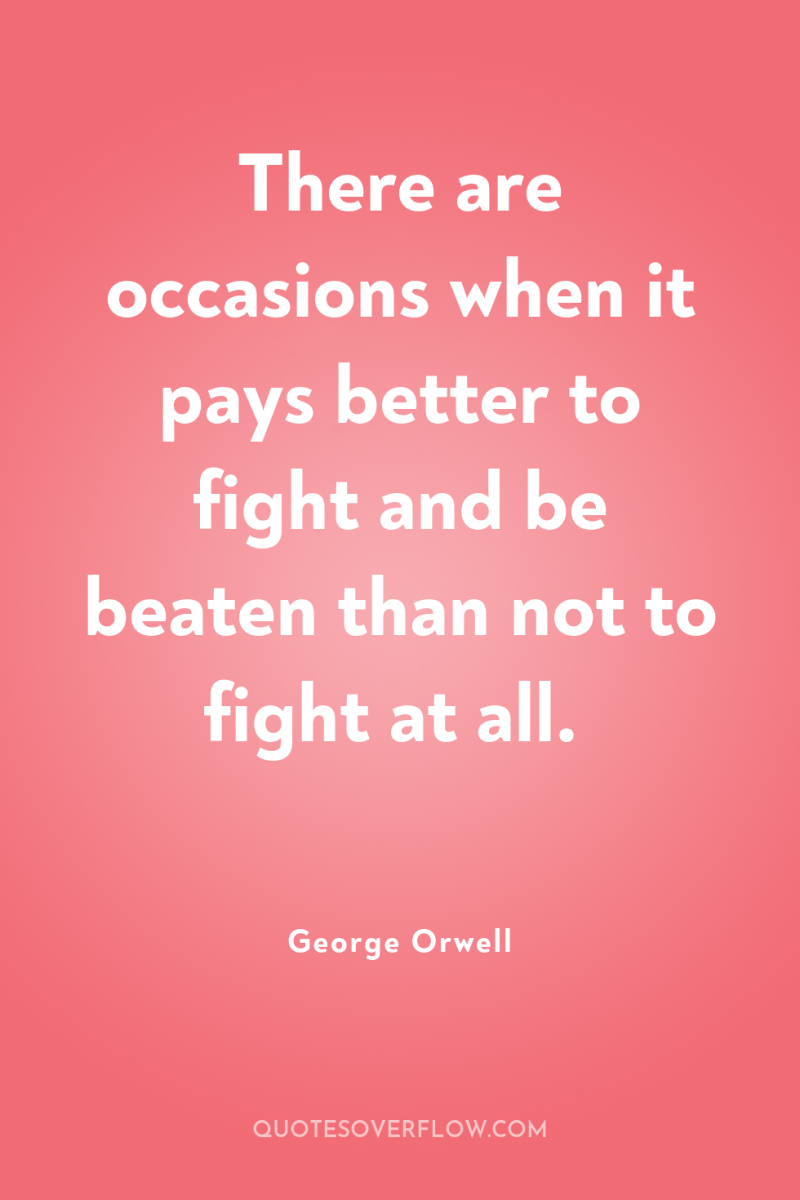
63
There are occasions when it pays better to fight and be beaten than not to fight at all.George Orwell
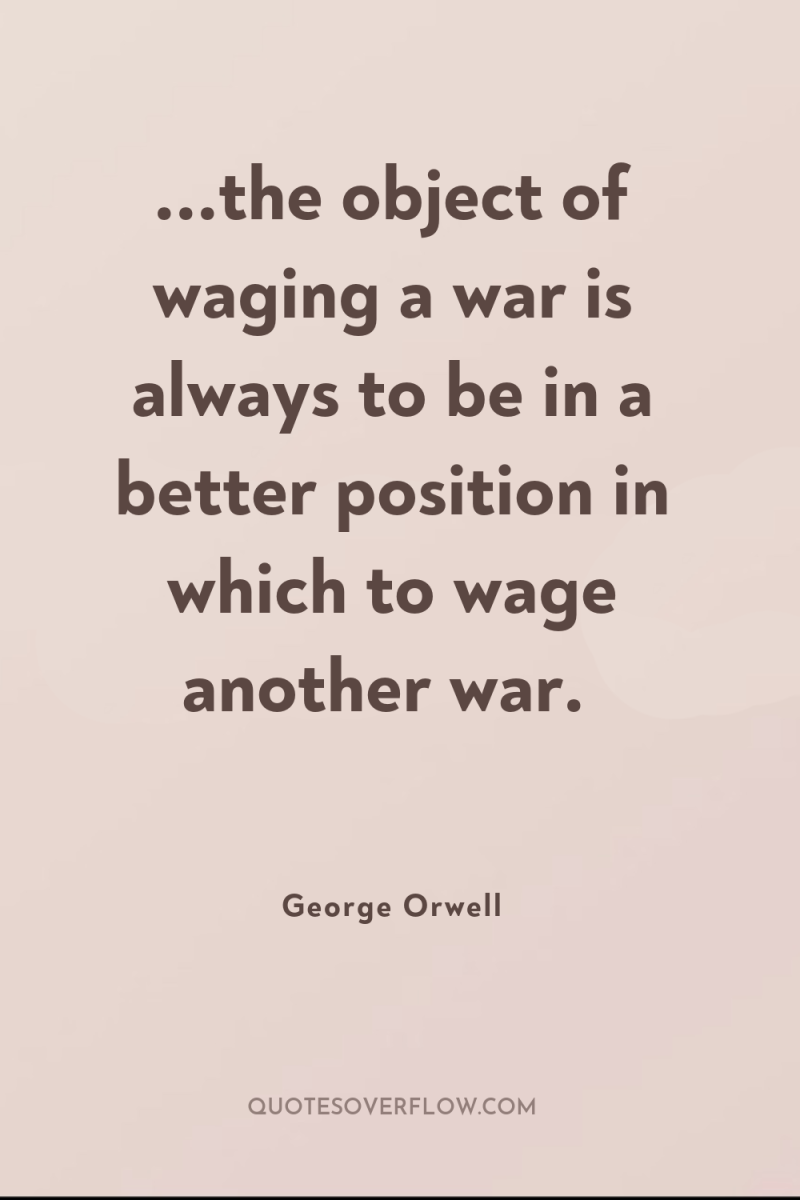
65
...the object of waging a war is always to be in a better position in which to wage another war.George Orwell
66
Serious sport has nothing to do with fair play. It is bound up with hatred, jealousy, boastfulness, disregard of all rules and sadistic pleasure in witnessing violence. In other words, it is war minus the shooting. (in "The Sporting Spirit", Tribune, GB, London, December 1945)George Orwell
67
If he were allowed contact with foreigners he would discover that they are creatures similar to himself and that most of what he has been told about them is lies. The sealed world in which he lives would be broken, and the fear, hatred, and self-righteousness on which his morale depends might evaporate. It is therefore realized on all sides that however ofter Persia, or Egypt, or Java, or Ceylon may change hands, the main frontiers must never be crossed by anything except bombs.George Orwell
68
Even the humblest Party member is expected to be competent, industrious, and even intelligent within narrow limits, but it is also necessary that he should be a credulous and ignorant fanatic whose prevailing moods are fear, hatred, adulation, and orgiastic triumph. In other words it is necessary that he should have the mentality appropriate to a state of war. It does not matter whether the war is actually happening, and, since no decisive victory is possible, it does not matter whether the war is going well or badly. All that is needed is that a state of war should exist. .George Orwell
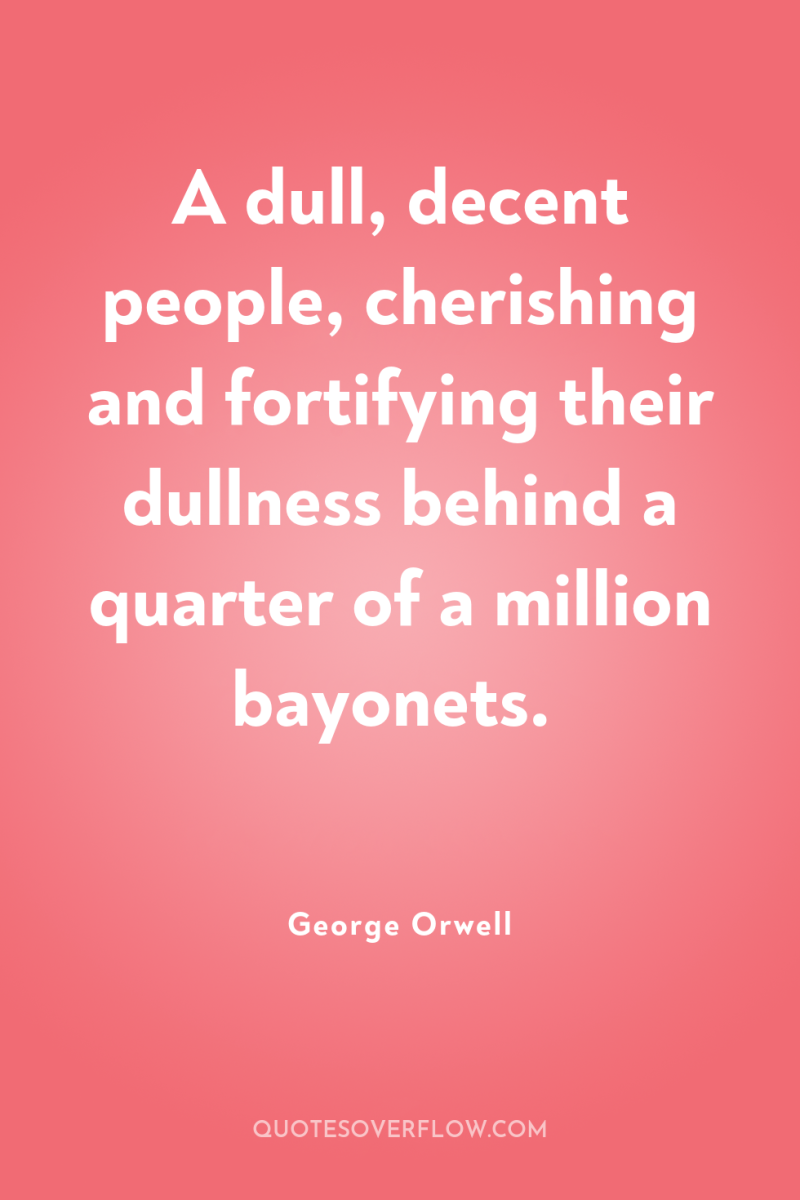
69
A dull, decent people, cherishing and fortifying their dullness behind a quarter of a million bayonets.George Orwell
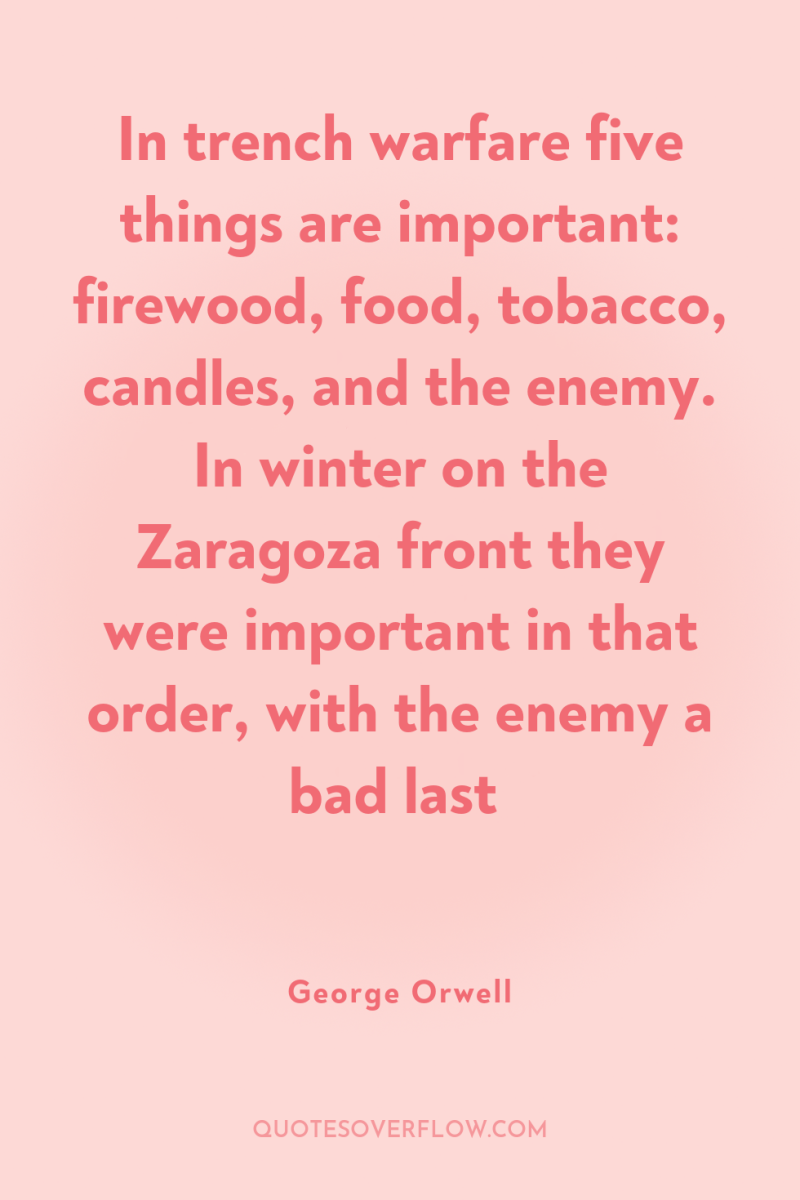
70
In trench warfare five things are important: firewood, food, tobacco, candles, and the enemy. In winter on the Zaragoza front they were important in that order, with the enemy a bad lastGeorge Orwell
71
A not-too-distant explosion shakes the house, the windows rattle in their sockets, and in the next room the class of 1964 wakes up and lets out a yell or two. Each time this happens I find myself thinking, "Is it possible that human beings can continue with this lunacy very much longer?" You know the answer, of course.George Orwell
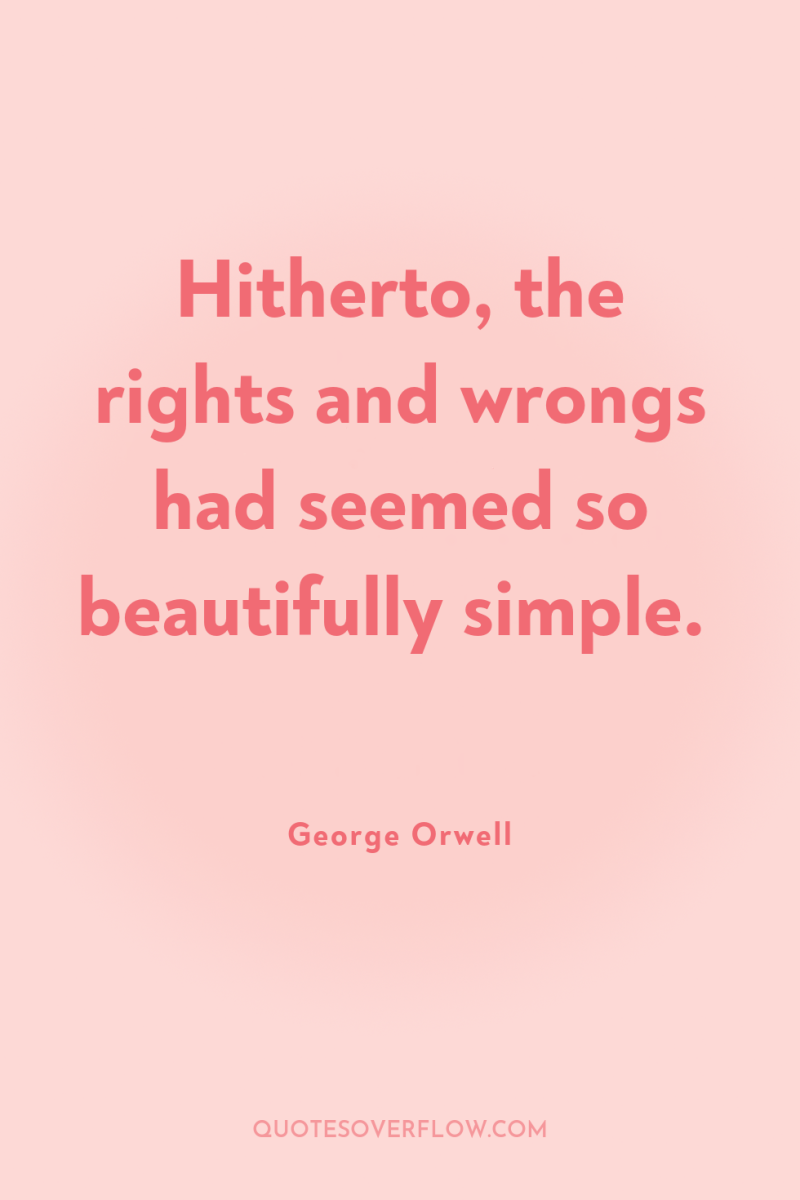
72
Hitherto, the rights and wrongs had seemed so beautifully simple.George Orwell
73
War, it will be seen, is now a purely internal affair. In the past, the ruling groups of all countries, although they might recognize their common interest and therefore limit the destructiveness of war, did fight against one another, and the victor always plundered the vanquished. In our own day they are not fighting against one another at all. The war is waged by each ruling group against its own subjects, and the object of the war is not to make or prevent conquests of territory, but to keep the structure of society intact. .George Orwell
74
I suppose there hasn’t been a single month since the war, in any trade you care to name, in which there weren’t more men than jobs. It’s brought a peculiar, ghastly feeling into life. It’s like on a sinking ship when there are nineteen survivors and fourteen lifebelts. But is there anything particularly modern in that, you say? Has it anything to do with the war? Well, it feels as if it had. The feeling that you’ve got to be everlastingly fighting and hustling, that you’ll never get anything unless you grab it from somebody else, that there’s always somebody after your job, that next month or the month after they’ll be reducing staff and it’s you that’ll get the bird — that, I swear, didn’t exist in the old life before the war.George Orwell
75
The war is not meant to be won. It is meant to be continuous. The essential act of modern warfare is the destruction of the produce of human labour. A hierarchical society is only possible on the basis of poverty and ignorance. In principle, the war effort is always planned to keep society on the brink of starvation. The war is waged by the ruling group against its own subjects, and its object is not victory over Eurasia or Eastasia, but to keep the very structure of society intact." Julia? Are you awake? There is truth, and there is untruth. To be in a minority of one doesn't make you mad. .George Orwell
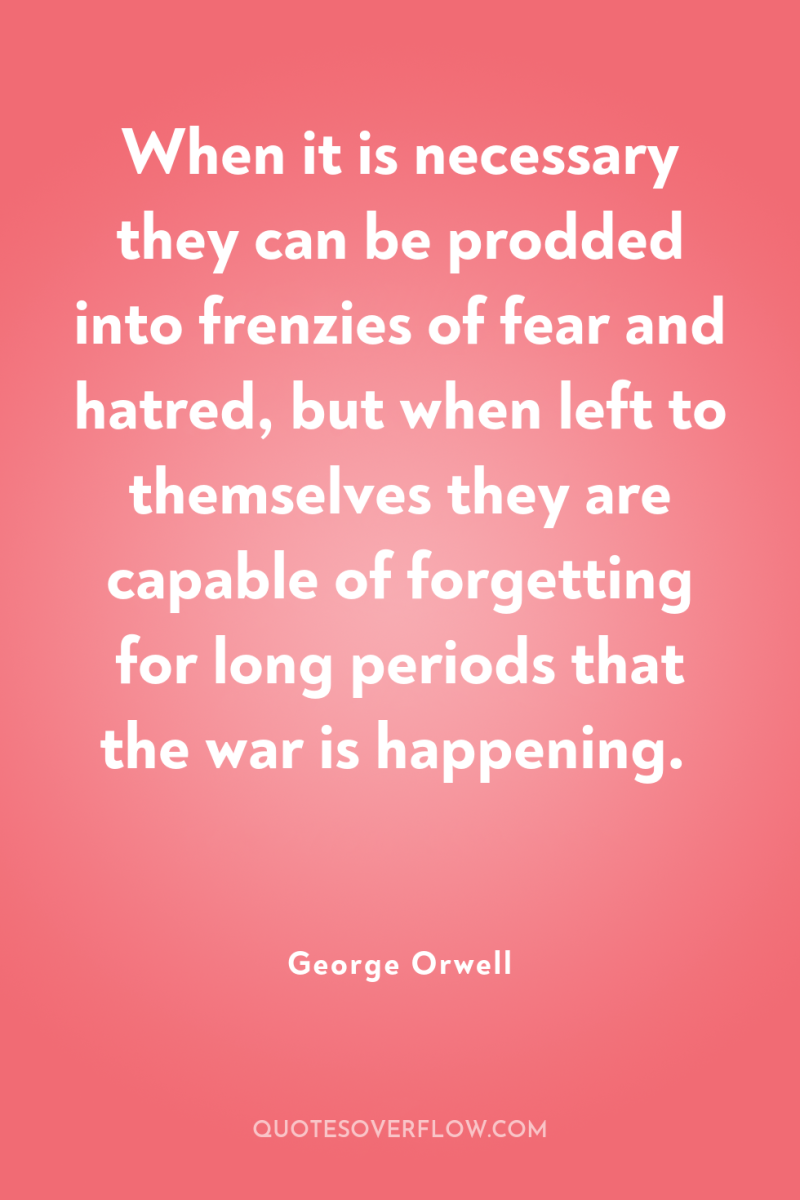
76
When it is necessary they can be prodded into frenzies of fear and hatred, but when left to themselves they are capable of forgetting for long periods that the war is happening.George Orwell
77
The citizen of Oceania is not allowed to know anything of the tenets of the other two philosophies... Everywhere there is the same pyramidal structure, the same worship of semi-divine leader, the same economy existing by and for continuous warfare.George Orwell
78
The Assault Guards had one submachine-gun between ten men and an automatic pistol each; we at the front had approximately one machine-gun between fifty men, and as for pistols and revolvers, you could only procure them illegally. As a matter of fact, though I had not noticed it till now, it was the same everywhere. The Civil Guards and Carabineros, who were not intended for the front at all, were better armed and far better clad than ourselves. I suspect it is the same in all wars-always the same contrast between the sleek police in the rear and the ragged soldiers in the line. .George Orwell
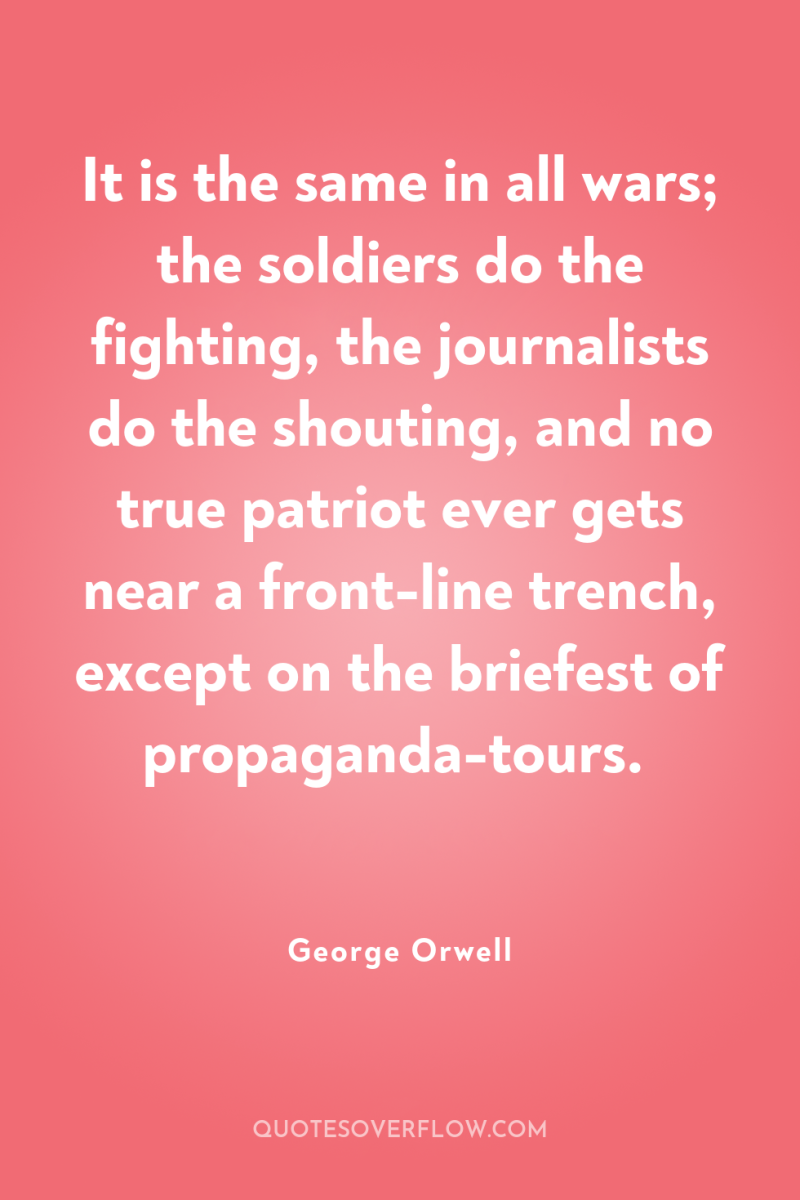
79
It is the same in all wars; the soldiers do the fighting, the journalists do the shouting, and no true patriot ever gets near a front-line trench, except on the briefest of propaganda-tours.George Orwell
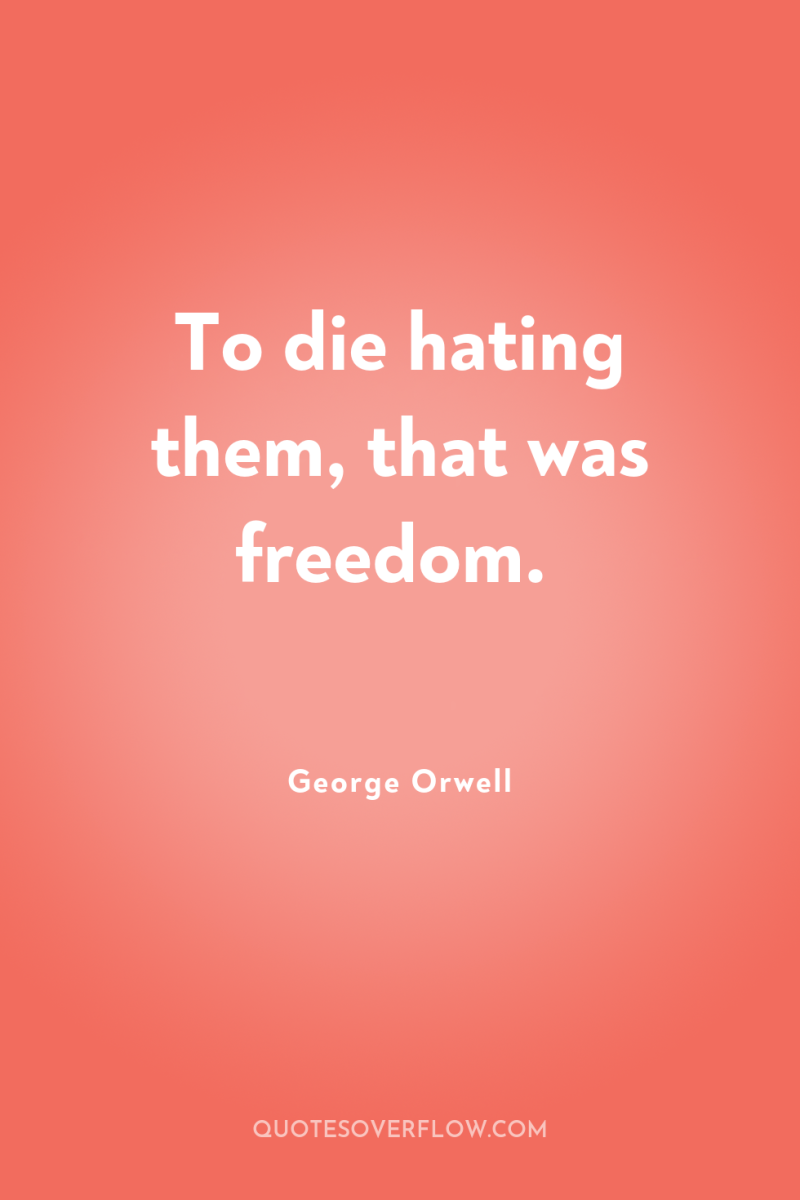
80
To die hating them, that was freedom.George Orwell
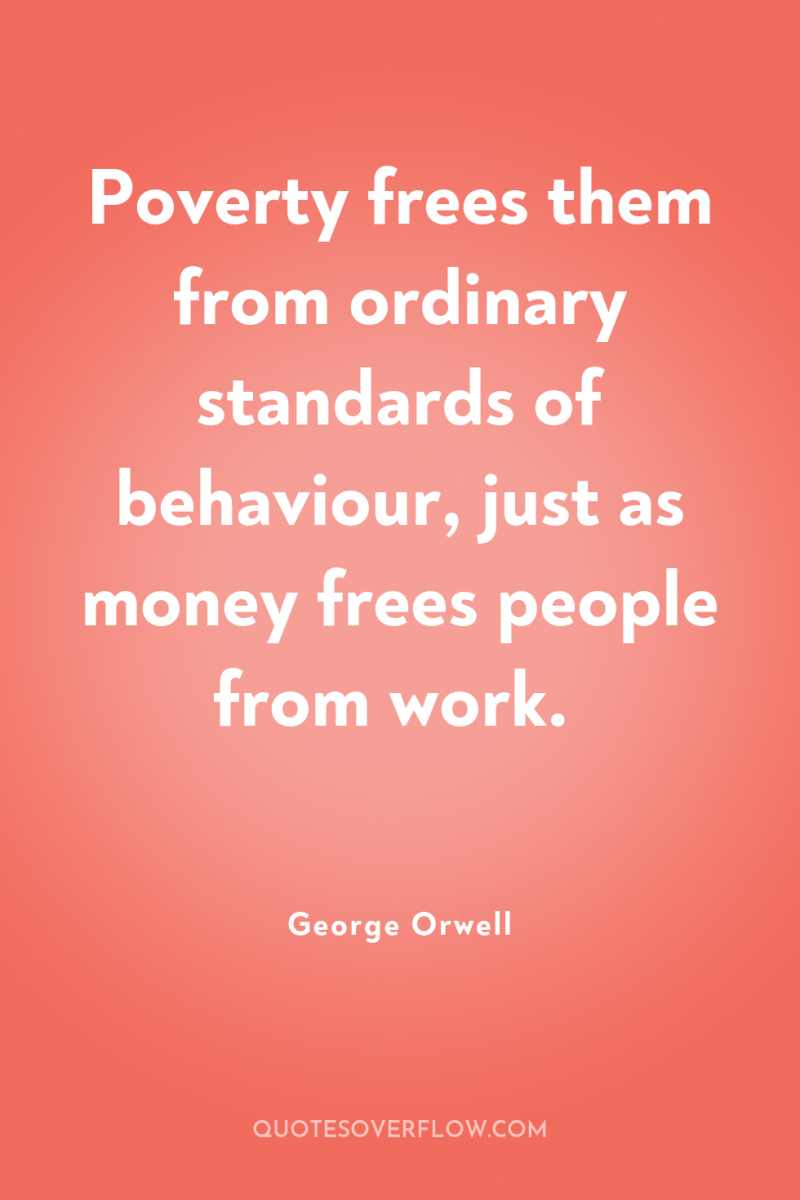
81
Poverty frees them from ordinary standards of behaviour, just as money frees people from work.George Orwell
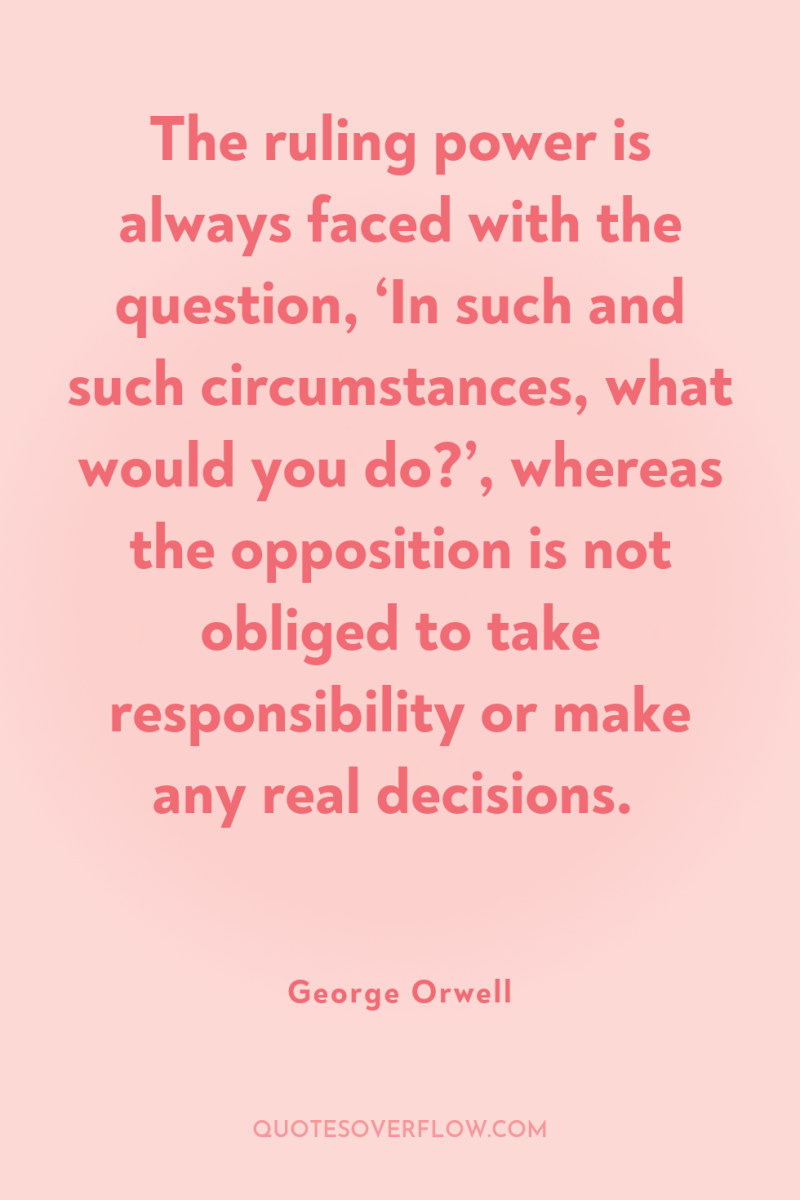
82
The ruling power is always faced with the question, ‘In such and such circumstances, what would you do?’, whereas the opposition is not obliged to take responsibility or make any real decisions.George Orwell
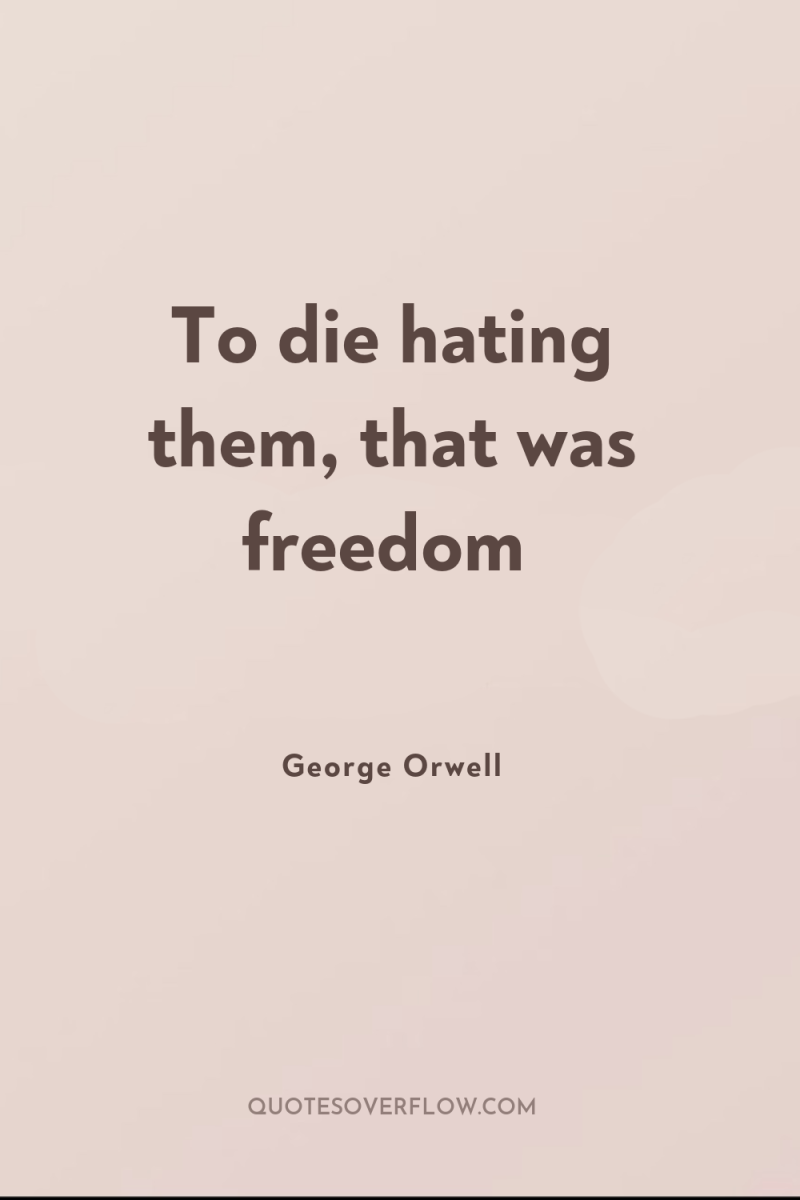
83
To die hating them, that was freedomGeorge Orwell
84
The girl with dark hair was coming towards them across the field. With what seemed a single movement she tore off her clothes and flung them disdainfully aside. Her body was white and smooth, but it aroused no desire in him, indeed he barely looked at it. What overwhelmed him in that instant was admiration for the gesture with which she had thrown her clothes aside. With its grace and carelessness it seemed to annihilate a whole culture, a whole system of thought, as though Big Brother and the Party and the Thought Police could all be swept into nothingness by a single splendid movement of the arm. That too was a gesture belonging to the ancient time. Winston woke up with the word ‘Shakespeare’ on his lips. .George Orwell
85
When you make love you're using up energy; and afterwards you feel happy and don't give a damn for anything. They can't bear you to feel like that. They want you to be bursting with energy all the time. All this marching up and down and cheering and waving flags is simply sex gone sour. If you're happy inside yourself, why should you get excited about Big Brother and the Three-Year Plans and the Two Minutes Hate and all the rest of their bloody rot? .George Orwell
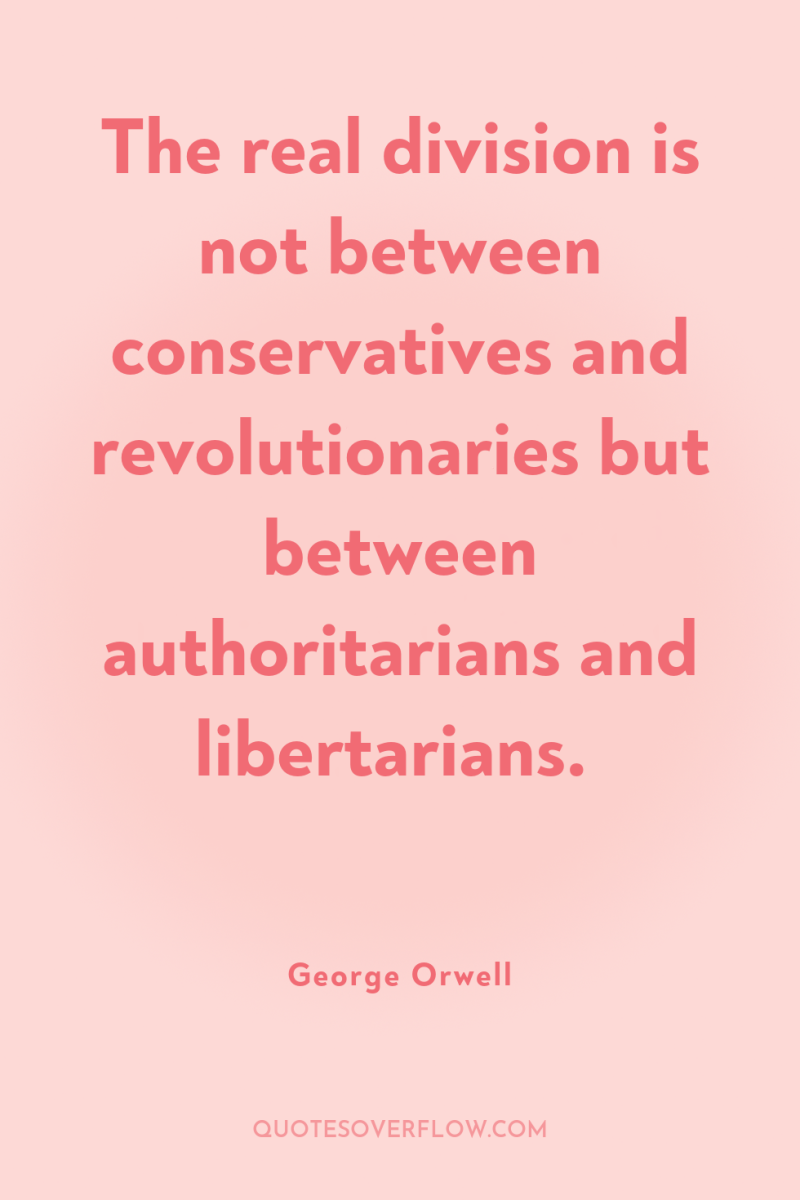
86
The real division is not between conservatives and revolutionaries but between authoritarians and libertarians.George Orwell
87
When one thinks of all the people who support or have supported Fascism, one stands amazed at their diversity. What a crew! Think of a programme which at any rate for a while could bring Hitler, Petain, Montagu Norman, Pavelitch, William Randolph Hearst, Streicher, Buchman, Ezra Pound, Juan March, Cocteau, Thyssen, Father Coughlin, the Mufti of Jerusalem, Arnold Lunn, Antonescu, Spengler, Beverley Nichols, Lady Houston, and Marinetti all into the same boat! But the clue is really very simple. They are all people with something to lose, or people who long for a hierarchical society and dread the prospect of a world of free and equal human beings. Behind all the ballyhoo that is talked about ‘godless’ Russia and the ‘materialism’ of the working class lies the simple intention of those with money or privileges to cling to them. Ditto, though it contains a partial truth, with all the talk about the worthlessness of social reconstruction not accompanied by a ‘change of heart’. The pious ones, from the Pope to the yogis of California, are great on the’ change of heart’, much more reassuring from their point of view than a change in the economic system.George Orwell
88
Here one comes upon an all-important English trait: the respect for constituitionalism and legality, the belief in 'the law' as something above the state and above the individual, something which is cruel and stupid, of course, but at any rate incorruptible. It is not that anyone imagines the law to be just. Everyone knows that there is one law for the rich and another for the poor. But no one accepts the implications of this, everyone takes for granted that the law, such as it is, will be respected, and feels a sense of outrage when it is not. Remarks like 'They can't run me in; I haven't done anything wrong', or 'They can't do that; it's against the law', are part of the atmosphere of England. The professed enemies of society have this feeling as strongly as anyone else. One sees it in prison-books like Wilfred Macartney's Walls Have Mouths or Jim Phelan's Jail Journey, in the solemn idiocies that take places at the trials of conscientious objectors, in letters to the papers from eminent Marxist professors, pointing out that this or that is a 'miscarriage of British justice'. Everyone believes in his heart that the law can be, ought to be, and, on the whole, will be impartially administered. The totalitarian idea that there is no such thing as law, there is only power, has never taken root. Even the intelligentsia have only accepted it in theory. An illusion can become a half-truth, a mask can alter the expression of a face. The familiar arguments to the effect that democracy is 'just the same as' or 'just as bad as' totalitarianism never take account of this fact. All such arguments boil down to saying that half a loaf is the same as no bread. In England such concepts as justice, liberty and objective truth are still believed in. They may be illusions, but they are powerful illusions. The belief in them influences conduct, national life is different because of them. In proof of which, look about you. Where are the rubber truncheons, where is the caster oil? The sword is still in the scabbard, and while it stays corruption cannot go beyond a certain point. The English electoral system, for instance, is an all but open fraud. In a dozen obvious ways it is gerrymandered in the interest of the moneyed class. But until some deep change has occurred in the public mind, it cannot become completely corrupt. You do not arrive at the polling booth to find men with revolvers telling you which way to vote, nor are the votes miscounted, nor is there any direct bribery. Even hypocrisy is powerful safeguard. The hanging judge, that evil old man in scarlet robe and horse-hair wig, whom nothing short of dynamite will ever teach what century he is living in, but who will at any rate interpret the law according to the books and will in no circumstances take a money bribe, is one of the symbolic figures of England. He is a symbol of the strange mixture of reality and illusion, democracy and privilege, humbug and decency, the subtle network of compromises, by which the nation keeps itself in its familiar shape. .George Orwell
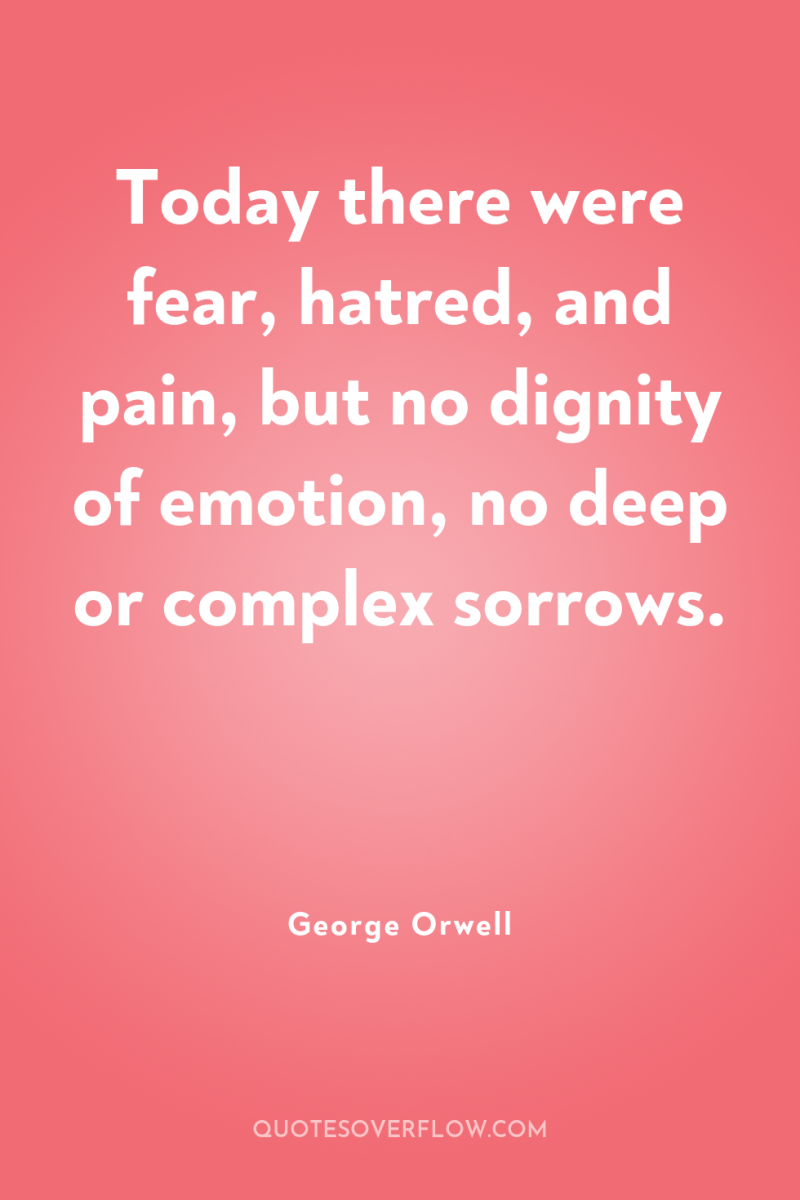
89
Today there were fear, hatred, and pain, but no dignity of emotion, no deep or complex sorrows.George Orwell
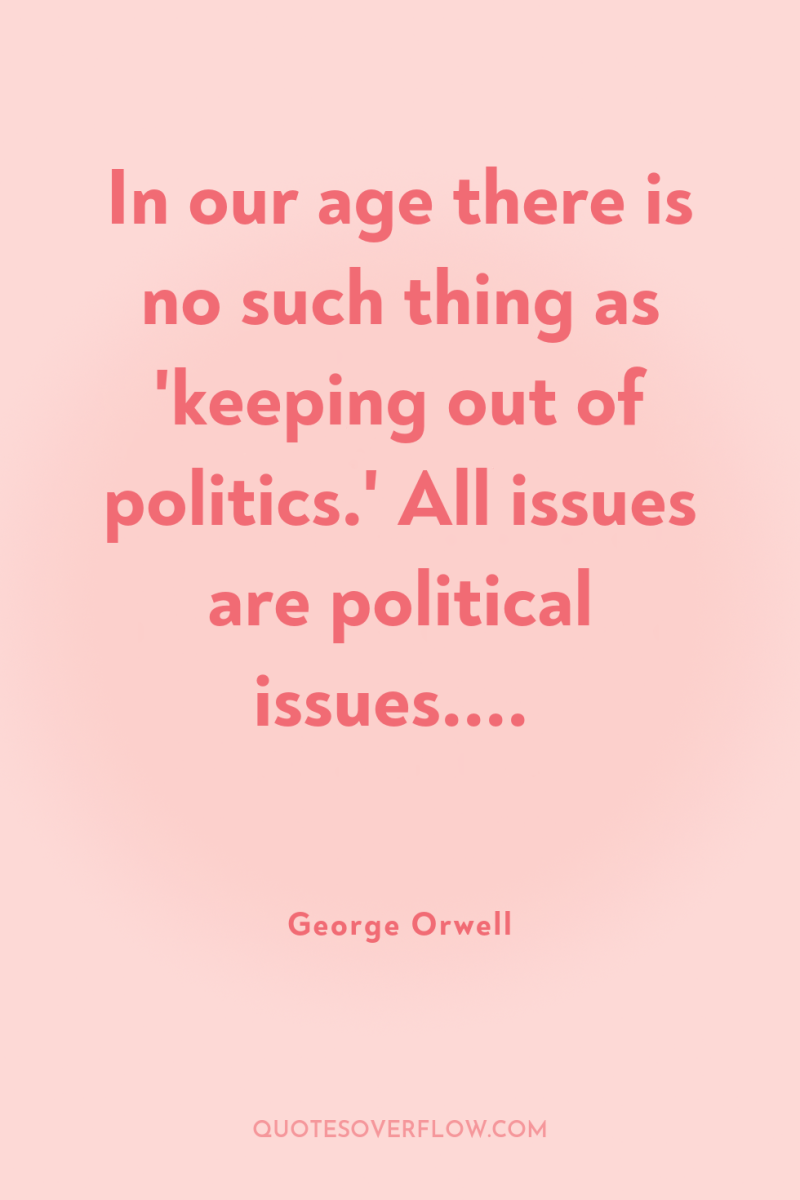
90
In our age there is no such thing as 'keeping out of politics.' All issues are political issues....George Orwell
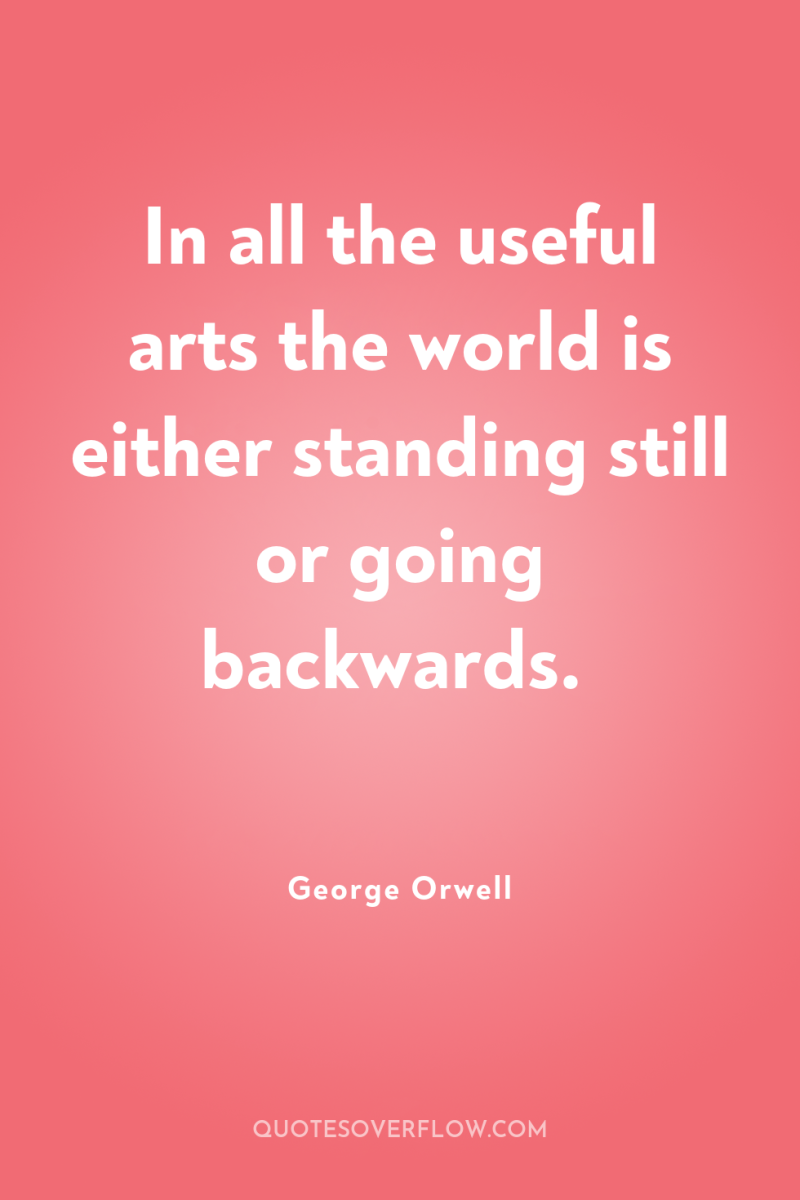
91
In all the useful arts the world is either standing still or going backwards.George Orwell
92
The thing that strikes me more and more, is the extraordinary viciousness and dishonesty of political controversy in our time. I don’t mean merely that controversies are acrimonious. They ought to be that when they are on serious subjects. I mean that almost nobody seems to feel that an opponent deserves a fair hearing or that the objective truth matters as long as you can score a neat debating point. .George Orwell
93
It is deliberate policy to keep even the favoured groups somewhere near the brink of hardship, because a general state of scarcity increases the importance of small privileges and thus magnifies the distinction between one group and another.George Orwell
94
Political or military commentators, like astrologers, can survive almost any mistake, because their more devoted followers do not look to them for an appraisal of the facts but for the stimulation of nationalistic loyaltiesGeorge Orwell
95
It is deliberate policy to keep even the favoured groups somewhere near the brink of hardship, because a general state of scarcity increases the importance of small privileges and thus magnifies the distinction between one group and another. By the standards of the early twentieth century, even a member of the Inner Party lives an austere, laborious kind of life. Nevertheless, the few luxuries that he does enjoy his large, well-appointed flat, the better texture of his clothes, the better quality of his food and drink and tobacco, his two or three servants, his private motor-car or helicopter–set him in a different world from a member of the Outer Party, and the members of the Outer Party have a similar advantage in comparison with the submerged masses whom we call ‘the proles’.George Orwell
96
And why do you imagine that we bring people to this place?’ ‘To make them confess.’ ‘No, that is not the reason. Try again.’ ‘To punish them.’ ‘No! ’ exclaimed O’Brien. His voice had changed extraordinarily, and his face had suddenly become both stern and animated. ‘No! Not merely to extract your confession, not to punish you. Shall I tell you why we have brought you here? To cure you! To make you sane! Will you understand, Winston, that no one whom we bring to this place ever leaves our hands uncured? We are not interested in those stupid crimes that you have committed. The Party is not interested in the overt act: the thought is all we care about. We do not merely destroy our enemies, we change them. Do you understand what I mean by that? .George Orwell
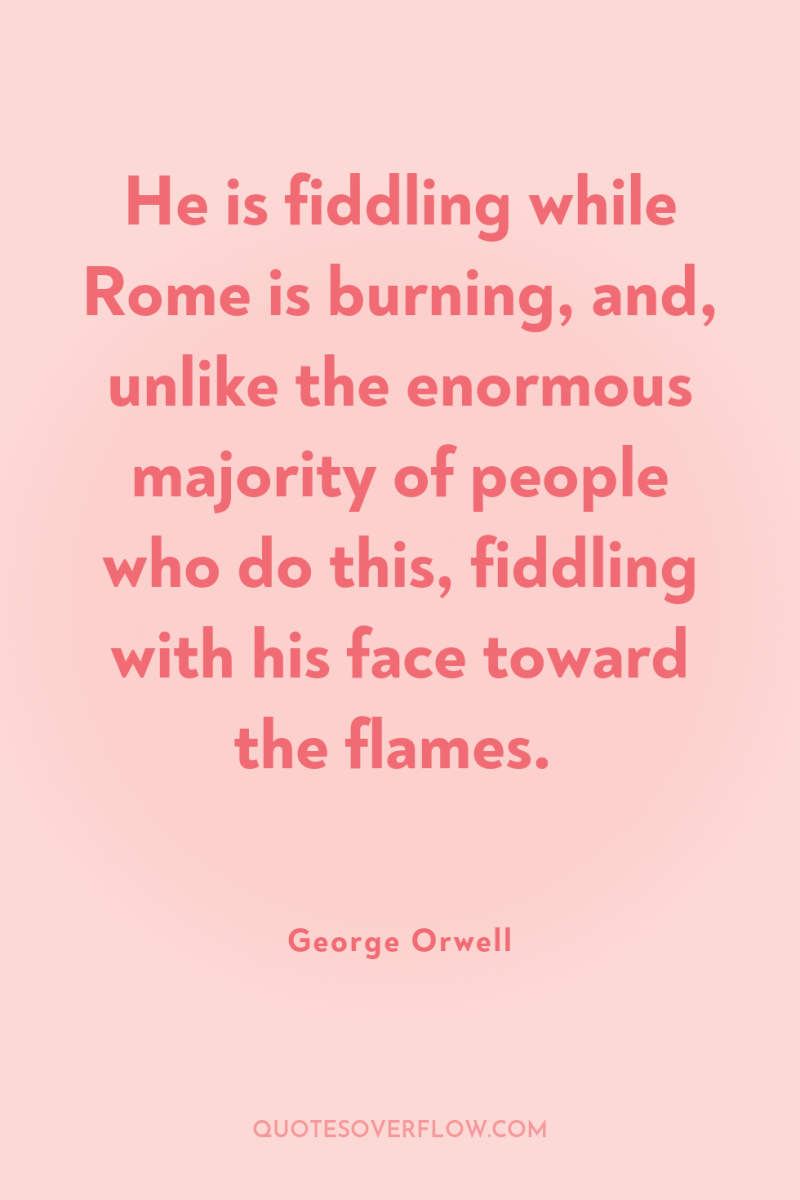
97
He is fiddling while Rome is burning, and, unlike the enormous majority of people who do this, fiddling with his face toward the flames.George Orwell
98
Every line of serious work that I have written since 1936 has been written, directly or indirectly, against totalitarianism and for democratic socialism, as I understand it. It seems to me nonsense, in a period like our own, to think that one can avoid writing of such subjects. Everyone writes of them in one guise or another. It is simply a question of which side one takes and what approach one follows. And the more one is conscious of one's political bias, the more chance one has of acting politically without sacrificing one's aesthetic and intellectual integrity.George Orwell
99
Cut off from contact with the outer world, and with the past, the citizen of Oceania is like a man in interstellar space, who has no way of knowing which direction is up and which is down. The rulers of such a state are absolute, as the Pharaohs or the Caesars could not be.George Orwell
100
Political language … is designed to make lies sound truthful and murder respectable, and to give an appearance of solidity to pure wind. One cannot change this all in a moment, but one can at least change one’s own habits, and from time to time one can even, if one jeers loudly enough, send some worn-out and useless phrase — some jackboot, Achilles’ heel, hotbed, melting pot, acid test, veritable inferno or other lump of verbal refuse — into the dustbin where it belongs.George Orwell